|
May 11, 2019 - No. 17
Matters of
Concern to the
Polity
Blatant Government
Disregard for the
Rights of Refugees and Foreign Workers
  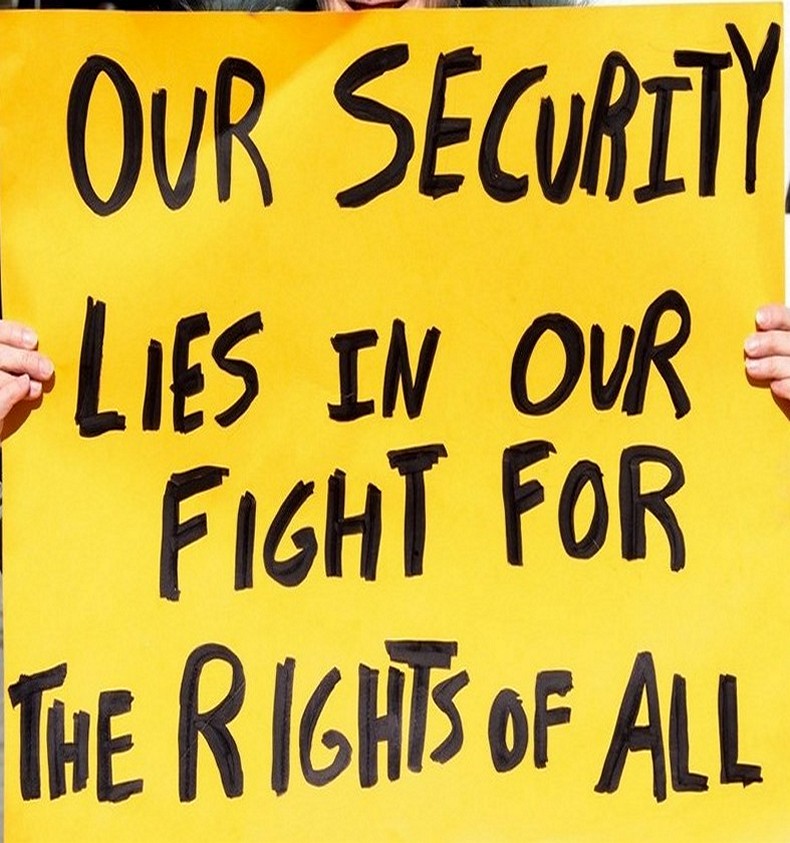
Blatant Government Disregard for
the Rights of Refugees
and Foreign Workers
• Perfidious
Government Measures to Curtail Refugee Asylum
Through Budget Implementation Bill
- Pauline Easton -
• Aligning
Workers' Lives with the Profit Motive and Vagaries
of the Market
Place
- Diane Johnston -
• Live-In
Caregivers Speak Out Against Arbitrary
Quebec Government
Measures
All Out to Humanize the Natural and
Social Environment and
Make Canada a Zone for Peace
• U.S. Must
Be
Held to Account for Its Disruption of
Arctic Council
Meeting
- Peter Ewart -
Canada and the International Rule of
Law
• Canadian
Network On Cuba Calls on Ottawa to
Reopen Visa Office in
Cuba
- Isaac Saney, Spokesperson -
• Huawei
Statement
Following Meng Wanzhou Case
Management
Hearing
Standing Up for Immigrant and Refugee
Rights
in the United States
• Students
and
Workers Oppose Escalation of
Trump Administration's Attacks
- Voice of Revolution -
• Johns
Hopkins Students Demand End to ICE Contracts,
No Armed Police on
Campus
• Wisconsin
Community Rejects Private Detention Centre
• Phoenix
Organizes to House Migrant Families
• Asylum Officers Speak Out
Against Trump Program
That Attacks Refugees
Illegal Economic Sanctions as
Collective Punishment
• U.S.
Sanctions Violate Human Rights and
International Code of Conduct
- UN Office of the High
Commissioner on Human Rights -
71st Anniversary of Al Nakba
• Stand with
the Palestinian People in Their Just Struggle!
Affirm the Right
to Return!
• Condemn
Zionist Occupiers Latest Criminal Bombardment
of Gaza Strip
- Nick Lin -
• Statement
from Palestine Center for Human Rights
Regarding Aggression on
Gaza Strip
• Let Issam
Stay Campaign Launches New Appeal to
the People of Canada
74th Anniversary of Victory over
Fascism in Europe
• Honour the
Memory of All Those Who Fought to Defeat
Fascism by Making Canada
a Zone for Peace
• Worldwide
Immortal Regiment Marches
Supplement
Canada Post's Fraudulent Accounting Methods
• Postal
Workers Produce Enormous
Value for the Economy and People
- K.C. Adams -
Blatant Government Disregard for the
Rights of Refugees
and Foreign Workers
- Pauline Easton -
When in the Opposition in Parliament, the Liberal
Party
railed against the Harper Conservative government's use of omnibus
legislation
to pass all kinds of self-serving measures to which the people never
consented. It pretended to speak openly and loudly about how
wrong the practice was and even pointed to the abuse of the
democratic process, intimating the problems this could cause. Now
its own repeated use of omnibus legislation, such as the Budget
Implementation Bill, shows that its aim was not to uphold any
principle which would defend the interests of the polity but to
demean the Harper government for self-serving purposes. Canadians
are now concerned about the government's self-serving measures
which are an assault on the intent of international laws that
defend refugees, provide asylum, and protect them as a duty. It
is now known that tucked away in the Trudeau government's omnibus
bill, Budget Implementation Act, 2019, No. 1, is an
amendment to the Immigration and Refugee Protection Act
(IRPA) which sneaks in unacceptable changes. This shows that the
cynicism of this
government knows no bounds.
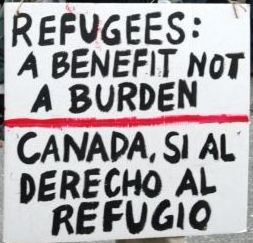 Under current law and
international agreements Canada must grant a hearing to those claiming
asylum once they have reached Canadian soil, except for those denied
that possibility under the Safe Third Country Agreement with the U.S.
Under the proposed change, refugee claimants would no longer
automatically receive a hearing at the Immigration and Refugee Board
(IRB) after arrival in Canada to evaluate their claim for asylum if
they had previously made a refugee claim in another country with which
Canada has an information sharing-agreement. At present this appears to
include Australia, New Zealand and the UK as well as the U.S.[1] Instead of a hearing, their case would
be evaluated through a paper application process to be ruled on by an
immigration officer. This change would exclude many of those seeking
refugee status from a proper hearing given that they typically would be
arriving in Canada via other countries. Under current law and
international agreements Canada must grant a hearing to those claiming
asylum once they have reached Canadian soil, except for those denied
that possibility under the Safe Third Country Agreement with the U.S.
Under the proposed change, refugee claimants would no longer
automatically receive a hearing at the Immigration and Refugee Board
(IRB) after arrival in Canada to evaluate their claim for asylum if
they had previously made a refugee claim in another country with which
Canada has an information sharing-agreement. At present this appears to
include Australia, New Zealand and the UK as well as the U.S.[1] Instead of a hearing, their case would
be evaluated through a paper application process to be ruled on by an
immigration officer. This change would exclude many of those seeking
refugee status from a proper hearing given that they typically would be
arriving in Canada via other countries.
Richard Goldman, a lawyer with the Montreal-based
Committee to
Aid Refugees, points out that the proposed change "would be
turning back the clock to before 1985, when the Supreme Court of
Canada ruled that all refugee claimants have the right to an oral
hearing."[2]
Thousands of people have been forced to flee their
country of origin because of economic strife, war or violence
(including various unjust wars of aggression and so-called regime
change that Canada has participated in), with many determined to seek
refuge in Canada. Often, they
have first had to travel through the U.S. Once intercepted by
U.S. border officials, they make a refugee claim, hoping to be
released to continue on to Canada. To gain access to Canadian
soil, they are forced to cross irregularly at places such as
Roxham Road in Saint-Bernard-de-Lacolle, Quebec, because of the
Canada-U.S. Safe Third Country Agreement. Even without the
proposed change in the budget implementation bill, this Agreement
already allows Canada to turn back all refugee claimants who
arrive from the U.S. at official border crossings.
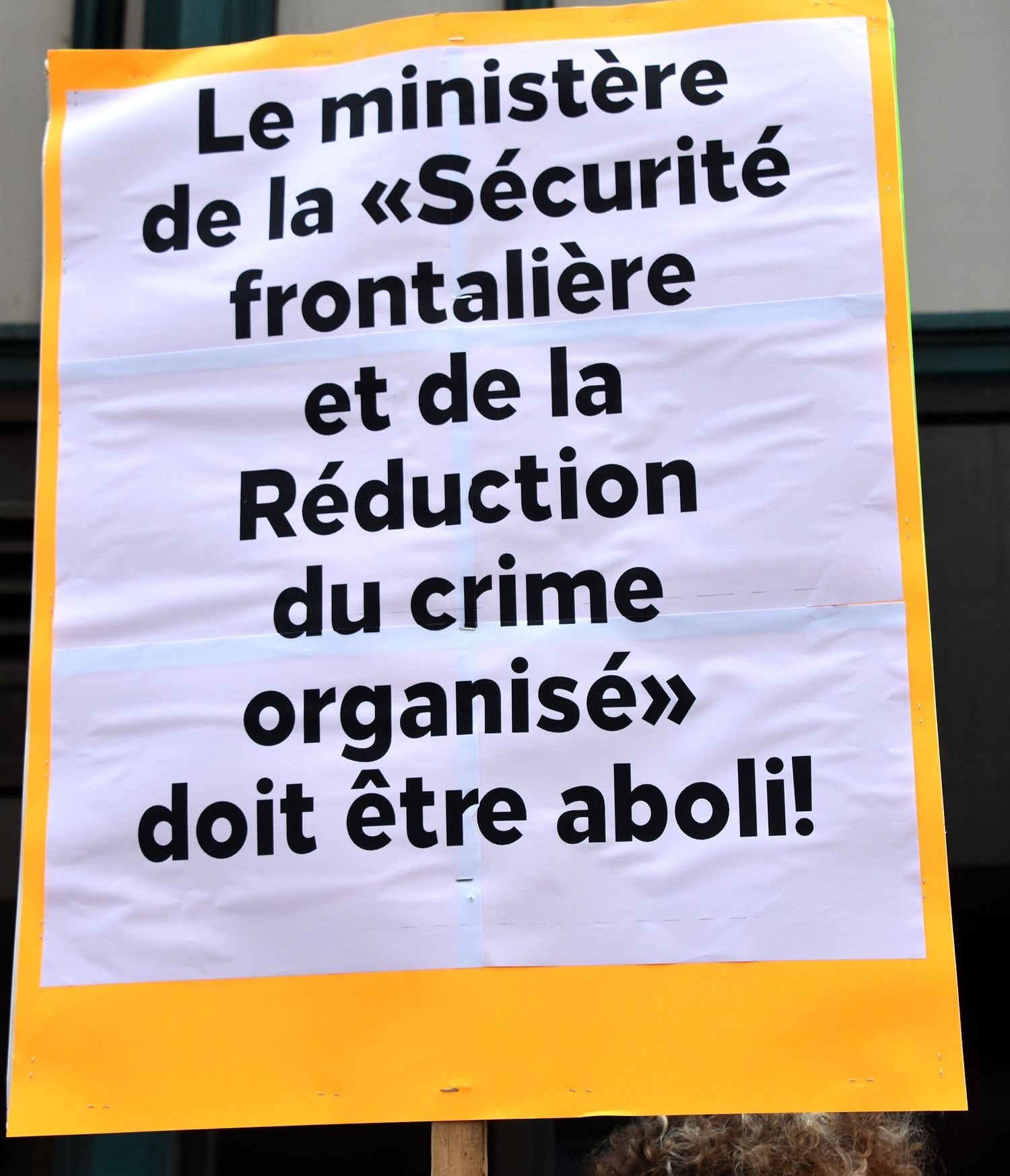 This part was already
established when Prime Minister
Justin
Trudeau announced the creation of the Ministry of Border Security
and Organized Crime Reduction on July 28, 2018 and appointed Bill
Blair as Minister. Through perfidious sleight of hand, the
Trudeau government found a way to link vulnerable migrants with
border security and organized crime. By making the irregular
crossing of asylum seekers at Saint-Bernard-de-Lacolle, Quebec and
anywhere else in
Canada an issue of law and order, Trudeau turned those seeking
asylum into a criminal category, all in the name of upholding
fair treatment and rule of law, which is unconscionable.
Trudeau's mandate letter to the minister reads in part: "Your
goals are to ensure that our borders remain secure and to lead
cross-government efforts to reduce organized crime. You will work
to ensure Canada's borders are managed to promote legitimate
travel and trade while keeping Canadians safe and treating
everyone fairly, in accordance with our laws. You will also play
a leading role in our efforts to reduce gun violence. [You] are
the Minister responsible for our strategy to manage the challenge
of irregular migration."[3] This part was already
established when Prime Minister
Justin
Trudeau announced the creation of the Ministry of Border Security
and Organized Crime Reduction on July 28, 2018 and appointed Bill
Blair as Minister. Through perfidious sleight of hand, the
Trudeau government found a way to link vulnerable migrants with
border security and organized crime. By making the irregular
crossing of asylum seekers at Saint-Bernard-de-Lacolle, Quebec and
anywhere else in
Canada an issue of law and order, Trudeau turned those seeking
asylum into a criminal category, all in the name of upholding
fair treatment and rule of law, which is unconscionable.
Trudeau's mandate letter to the minister reads in part: "Your
goals are to ensure that our borders remain secure and to lead
cross-government efforts to reduce organized crime. You will work
to ensure Canada's borders are managed to promote legitimate
travel and trade while keeping Canadians safe and treating
everyone fairly, in accordance with our laws. You will also play
a leading role in our efforts to reduce gun violence. [You] are
the Minister responsible for our strategy to manage the challenge
of irregular migration."[3]
Creation of the Federal Ministry of Border Security and
Organized Crime
The new ministry's creation was an attempt on the part
of the
Trudeau government to establish a causality between organized
crime and "irregular migration." The reality is that people are
crossing the border irregularly because the Safe Third
Country Agreement with the U.S. prevents them from applying as
refugees at official border posts. Logically, the solution to
this problem would be to cancel this agreement and allow refugees
from the U.S. to apply in a regular way.
 The Trudeau government
rejected this path on October 22,
2018, when
Canadian immigration officials determined the U.S. remains a safe
third country for asylum seekers. They had the gall to reach this
verdict despite the Trump administration's crackdown on what it
terms illegal aliens and all migrants for that matter, its
separation of families, detention of women and children, and illegal
deportations, amongst other crimes the U.S. government is
committing. Documents obtained by the Canadian Press through
access-to-information show that Canada conducted a review of its
Safe Third Country agreement with the U.S. from January to March, 2017. The Trudeau government
rejected this path on October 22,
2018, when
Canadian immigration officials determined the U.S. remains a safe
third country for asylum seekers. They had the gall to reach this
verdict despite the Trump administration's crackdown on what it
terms illegal aliens and all migrants for that matter, its
separation of families, detention of women and children, and illegal
deportations, amongst other crimes the U.S. government is
committing. Documents obtained by the Canadian Press through
access-to-information show that Canada conducted a review of its
Safe Third Country agreement with the U.S. from January to March, 2017.
"Canada's analyses of these U.S. policies were redacted
from
the documents," the Canadian Press reported. The overall
conclusion reached by Canadian officials nonetheless was that
the United States "continues to meet the requirements for
designation as a safe third country."[4]
This showed that Canada as a land of injustice would
become
worse, especially with regard to what it called "irregular
migration," as if the plight of refugees is ever "regular." This
injustice has only deepened with the creation of the Ministry of Border
Security and Organized Crime,
inspired by U.S. Homeland Security and its Immigration and
Customs Enforcement, the dreaded ICE, which many in the U.S. want
abolished. ICE is the U.S. federal police agency used by former
President Obama and President Trump to terrorize what are called
"undocumented" immigrants and to oppress and separate families
crossing into the U.S. after fleeing various threats in
their home country.
The direction Canada has taken in matters related to
security is to integrate Canada's laws and police and intelligence
forces to U.S. Homeland Security in the name of meeting current
security challenges. This is tantamount to relying on the god's of
plague to rid the people of the plague. More, importantly, the measures
have completely undermined any basis for sovereignty vested in a
Canadian nation-state. Even though Canada was a creation of first the
British Empire in the first place and then became subordinate to U.S.
imperialism, the significance of the integration which has taken place
in the last 20 years are becoming very evident to the public because of
the results which are making Canada an active appeaser of and actor in
the crimes the U.S. imperialists are committing in their striving for
world domination. The working class must constitute the nation by
developing its independent thinking on these issues and ensure it takes
a stand to defend the rights of all under all conditions and
circumstances.
Background
U.S. Smart Border Declaration
The U.S.-Canada "Smart Border Declaration" was signed in
December
2001, by Tom Ridge, Director of Homeland Security in the administration
of President George W. Bush for the U.S. and by then-Deputy Prime
Minister
John Manley for Canada.
The declaration includes a 30-point plan with a
grandiose title designed to cover up the integration and subordination
of Canada border enforcement and security to U.S. Homeland Security:
"Action Plan to Enhance the Security of Our Shared Border While
Facilitating the Legitimate Flow of People and Goods." The plan has
what it calls "Four Pillars": the Secure Flow of People, the Secure
Flow Of Goods, a Secure Infrastructure, and Information Sharing; and,
coordination in the enforcement of these objectives."[5]
The 30-point Smart Border Action Plan includes:
- biometric identifiers,
- permanent resident cards,
- a
single alternative inspection system,
- refugee/asylum
processing,
- managing of refugee/asylum claims,
- visa
policy coordination,
- air preclearance,
- advance
passenger information/passenger name record,
- joint passenger
analysis units,
- maritime security and ferry terminals,
-
compatible immigration databases,
- immigration officers
overseas,
- international cooperation,
- clearance away
from the border,
- joint facilities,
- infrastructure
improvements,
- critical infrastructure protection,
- integrated border and marine enforcement teams,
- joint
enforcement coordination,
- integrated intelligence,
-
fingerprints,
- removal of deportees,
- counter-terrorism
legislation,
- joint training and exercises.[6]
President Bush and Prime Minister Jean Chrétien
met in the
fall of 2002 to discuss progress on the Smart Border Action Plan
and asked that they be "updated regularly on the work being done
to modernize our common border."[7]
The Canada Border Services Agency
The Canada Border Services Agency (CBSA) was created by
an
order in council on December 12, 2003 and put into legislation as the Canada Border Services Agency Act,
on
November
3, 2005. The
CBSA brings together the border services of the Canada Customs
and Revenue Agency, the Canadian Food Inspection Agency and the
Department of Citizenship and Immigration.[8]
The Harper Conservative government announced on August
31,
2006, "CBSA officers at land and marine Ports of Entry, as well
as officers who perform enforcement functions inland, will be
trained and equipped with side-arms."[9]
According to its website: The CBSA has a workforce of
approximately 14,000 employees, including over 6,500 uniformed
CBSA officers who provide services at approximately 1,200 points
across Canada and at 39 international locations. It manages 117
land-border crossings and operates at 13 international airports.
Officers carry out marine operations at major ports, the largest
being Halifax, Montreal and Vancouver and at 27 rail sites.
The CBSA investigates, detects, and apprehends violators
of
the Immigration and Refugee
Protection Act. It conducts
investigations of national security cases, and organized crime
groups. It represents the interests of the CBSA and Citizenship
and Immigration Canada at Minister's Delegate, Immigration
Division, Immigration Appeal Division, Refugee Protection
Division, and Federal Court proceedings. It processes and
examines international mail at three mail processing centres and
administers more than 90 acts, regulations and international
agreements, many on behalf of other federal departments and
agencies, the provinces and the territories.
As part of its responsibilities, the CBSA administers
legislation that governs the admissibility of people, detains
people who may pose a threat to Canada and removes people who are
considered inadmissible to Canada.[10]
On August 10, 2018, iPolitics reported that Canadian
refugee
advocate groups, including the BC Civil Liberties Association and
the Canadian Association of Research Librarians were calling for
an independent review of the CBSA in response to the death of a
49-year-old Nigerian man following an altercation with CBSA
officers while he was being deported. An altercation took place
on board a KLM flight from Calgary to Amsterdam. This is not the
first death of a foreign national facing deportation, according
to the BC Civil Liberties Association, which says more than 14
foreign nationals have died in CBSA custody.[11]
Many consider the CBSA to employ repressive, dishonest
and
underhanded measures against asylum seekers. For example,
refugees are sometimes summoned to appear on Saturdays for a
hearing, often preventing them from showing up with legal
counsel. If they become distraught upon learning that they will
be deported, they are at times placed in detention as a flight
risk. They are presented with the choice of purchasing their own
airline ticket back home. If they cannot, the government
purchases it for them at a much higher cost, with the CBSA
informing them that if ever they wish to return to Canada, their
debt must be cleared beforehand.
Notes
1. Information
Sharing
Between
Countries.
2. "Radical change to
Canadian asylum process wrong, unnecessary," Richard Goldman, Montreal
Gazette, May 2, 2019.
3. Minister
of
Border
Security
and
Organized
Crime
Reduction
Mandate
Letter,
August
28,
2018.
4."Canada
deemed
U.S.
a
safe
country
for
asylum
seekers
after
internal
review,"
Teresa
Wright,
Canadian
Press,
October
22, 2018.
5. The
White
House,
U.S.-Canada
Smart
Border/30
Point
Action
Plan
Update.
6. Ibid.
7. Ibid.
8. Order
Transferring
Certain
Portions
of
the
Canada
Customs
and
Revenue
Agency
to
the
Canada
Border
Services
Agency, SI/2003-216, Canada (Federal) Statutes and
Regulations SI/2003-216; Canada Border Services Agency Act.
9. "Prime
Minister
Harper
announces
initiatives
to
improve
Canada's
border
security,"
August
31,
2006.
10. Canada
Border
Services
Agency.
11. BC
Civil
Liberties
Association
Letter
to
Ralph
Goodale,
Minister
of
Public
Safety
and
Emergency
Preparedness,
February
14,
2019.

- Diane Johnston -

For years now, governments in Canada have played havoc
with the lives of foreign workers by continuously
changing the programs and regulations through which they seek
to permanently settle in Canada. In Quebec, various governments
have adopted regulatory amendments altering the number of points
allotted for certain selection criteria and raised the points
threshold applicants must meet to qualify for a Quebec Selection
Certificate (CSQ) in order to apply for permanent residency.
Those amendments, once adopted, take immediate effect and have
been consistently applied retroactively to a backlog of thousands
of application requests, despite the fact that those wishing to
settle in Quebec spent time, money and a lot of painstaking
effort in preparing their forms, certain they would qualify for
residency.
Evidence of the inhuman government treatment became
clearly known
on February 19, 2018 when the Superior Court of Quebec
authorized a class action against the Minister of Immigration and
the Government of Quebec with regard to the Quebec Regular
Skilled Worker Immigration Program. The authorized action alleged
that the defendants were unjustly enriched, committed a tort,
and acted in bad faith by refusing to offer to reimburse the
application fees paid by those class members whose CSQ
applications were doomed to failure as a result of amendments to the
Regulation respecting the
weighting applicable to the selection of foreign nationals.[1] A settlement
agreement
has since been reached and the Court will be hearing an
application for approval on June 19.
Before the June Court hearing, on February 7, Quebec
Immigration
Minister
Simon Jolin-Barrette introduced Bill 9, an act the government
fraudulently said is "to increase Quebec's socio-economic prosperity
and
adequately meet labour market needs through successful immigrant
integration." The proposed legislation would allow the Minister
to "impose conditions on the foreign national which affect the
permanent residence granted under the Immigration
and
Refugee
Protection
Act," to ensure, among other things, "the meeting of
regional and sectoral labour needs, the regional or sectoral
creation of enterprises or the financing of such enterprises, or
the foreign national's linguistic, social or economic
integration."
As part of the government's development of
"reception, francization and integration programs" for
immigrants, foreign workers would be forced to learn about and be
tested on so-called democratic and Quebec values as a condition
for permanent residency. This violates the right to conscience in
as much as applicants must either agree to imposed values or fail
the "test." Quebec citizens are not required to swear allegiance
to values at this point in time and dividing the polity on this
basis is unacceptable. Only the people themselves can express their
values, which can certainly not be defined and imposed by those who,
without the consent of the people, claim to act in their name.
Through Section 20 of the proposed legislation,
the
Legault government is attempting to terminate a backlog of some
18,000 CSQ applications filed before August 2, 2018 under the
Regular Skilled Worker Program, if on February 7, the date of the
bill's introduction, the Minister had not yet made a selection,
refusal or rejection decision on the application. As if this
provides redress for playing with people's lives, the legislation
says "Any required fees paid by an applicant having filed
such an application must be returned, without interest, to the
applicant." The same section also stipulates that "No damages or
indemnity may be claimed from the Government, the Minister or any
of their subordinates or mandataries in connection with such an
application."[2]
To counter the Legault government's move to stop
handling the
backlog of CSQ applications, the Association québécoise
des
avocats et avocates en droit de l'immigration (AQAADI), which
includes some 250 immigration lawyers, filed an
application for an injunction with the Superior Court of Quebec.
They argue that Quebec's Immigration Minister "acted
illegally in suspending the handling of the pending Regular
Skilled Worker Program (RSWP) applications" for a CSQ. They also argued
that the decision
"jeopardized the immigration plans of tens of thousands of
candidates, close to 6,000 of whom are already living in Quebec."
They sought the injunction to "direct" the Minister to
immediately resume evaluating the applications. AQAADI also
argued that the Minister has no discretionary power or other
statutory authority to refuse to handle the backlog of CSQ
applications. "Far from it -- the refusal ensues solely from the
premature application of a bill that has not yet been adopted by
the National Assembly and therefore has no binding force."
On February 25, the Superior Court of Quebec issued a
provisional interlocutory injunction ordering the Minister of
Immigration to continue handling the backlog of 18,000 CSQ
applications. In response to that
order, Immigration Minister Jolin-Barrette released a
statement declaring that his ministry "will respect the decision
of the Superior Court of Quebec. The Ministry of Immigration,
Diversity and Inclusiveness will continue to handle and take
decisions relating to applications for a [QSCs] within the framework of
the Regular Skilled Worker
Program until the adoption of the bill."
The bill is expected to be adopted before the National
Assembly's summer recess in mid-June, which once again means that
the files of thousands of CSQ applicants could be permanently
terminated, with no legal recourse afforded them. This inhumanity
is becoming increasingly intolerable. No society can afford to
permit such things as governments which act with impunity in the
name of the rule of law.
Notes
1. Quebec
Ministry
of
Immigration,
Diversity
and
Inclusiveness.
2. Quebec National Assembly
website,
Bill 9, An Act to increase Quebec's socio-economic
prosperity
and adequately meet labour market needs through successful
immigrant integration.

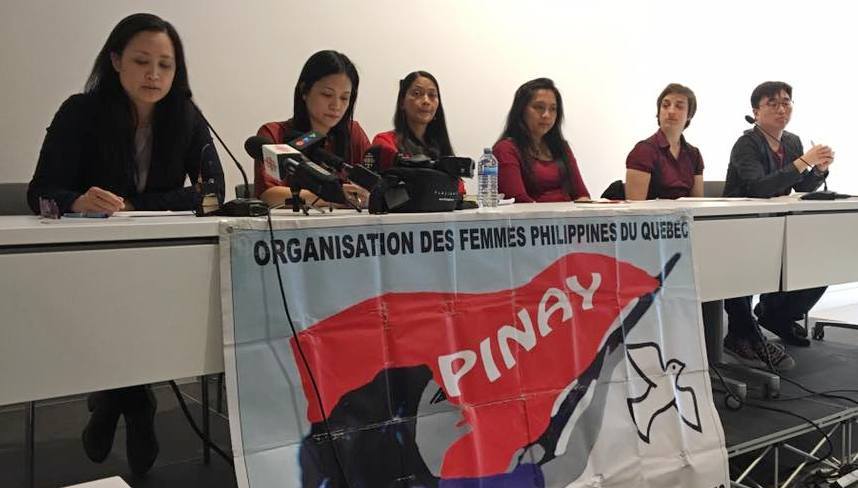
A press conference took place in Montreal on May 5 with
a
group of foreign domestic workers, whose access to permanent
residence has been affected by Bill 9, An Act to increase
Québec's socio-economic prosperity and adequately meet labour
market needs through successful immigrant integration. According
to the Centre for Immigrant Workers, which organized the press
conference, more than 80 women who came to Quebec under the Live-In
Caregiver Program have come forward to say they fear for their
future because of the bill.
 Although these workers came
to Quebec as part of the
federal
government's Temporary Foreign Worker Program (TFWP), the
specific program they fall under differs from others with regard
to applying for permanent residence. Persons admitted under their
program are able to apply for permanent residence after a few
years of service under the Regular Skilled Worker Program
(RSWP). Although these workers came
to Quebec as part of the
federal
government's Temporary Foreign Worker Program (TFWP), the
specific program they fall under differs from others with regard
to applying for permanent residence. Persons admitted under their
program are able to apply for permanent residence after a few
years of service under the Regular Skilled Worker Program
(RSWP).
All these workers began the process to obtain permanent
residency. And although it has been some time since the federal
Ministry of Immigration, Refugees and Citizenship Canada (IRCC)
sent them a letter acknowledging that they meet permanent
residence eligibility requirements, their Quebec application has
been either suspended or delayed by Bill 9.
The Quebec Ministry of Immigration, Diversity and
Inclusiveness (MIDI) stopped sending out Quebec Selection
Certificate (CSQ) application forms in December 2018. Those
who had already submitted a CSQ application received an email
from MIDI on February 7, the date Bill 9 was introduced
in the National Assembly, informing them that the handling of
their applications had been suspended. An injunction issued by
the Superior Court of Quebec then forced MIDI to continue
processing a backlog of 18,000 CSQ applications. However, it was
only after a complaint was lodged that some of these domestic
workers were sent the documents they required to apply for a CSQ.
As things presently stand, some have received a CSQ application form
for
themselves as the principal applicant but not for their family
members, while others who applied have received no
CSQ application form.
"We have been in Quebec for at least four years and have
worked hard for Quebec families, children and seniors. We want to
remain here with our families and continue to contribute to the
society," said Jennifer Rentiquiano. "The stress and anxiety this
is causing us is unjust after having fulfilled all our
obligations in becoming new immigrants to Quebec," she added.
"Everyone, the agencies and government of Canada
personnel
told us we would be able to obtain permanent residency and I did
everything I had to do. I am scheduled to give birth in July and
am worried about my status. Without being guaranteed status, what
can I do for my child?" asked Genie Zonoria Tagalogon. Many
others have children in the Philippines waiting to join their
mothers whom they have not seen for years.
"We are the only source of revenue for our family in our
country of origin. We have received the letter of eligibility
from the Canadian government. We worked hard while hoping that we
would be able to remain in the country. We are now faced with the
unexpected news that our applications have been suspended," said
Baby Aurea Santos Albay.
Jasmin de Calzada, a representative of the Filipino
Women's Organization of Quebec (PINAY),
noted that "Since the beginning
of the 20th century, Canada has largely relied on migrant workers
to provide care for families, particularly children. These
workers came to Canada and worked hard in the hope of a better
future for their children."
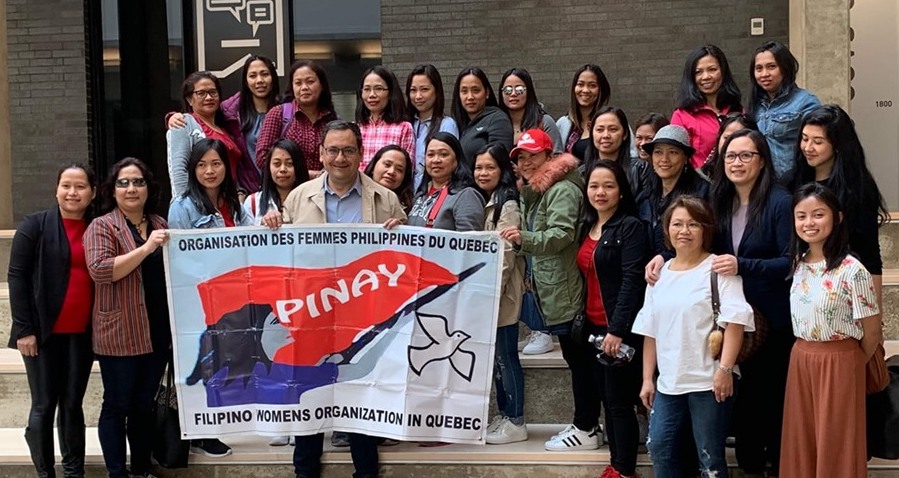

All Out to Humanize the Natural and
Social
Environment and
Make Canada a Zone for Peace
- Peter Ewart -

Published research shows that climate change is
bringing
about the end of the Arctic as we know it due to rising
temperatures, melting ice, changing snow cover, and disappearing
permafrost. Since 1971, eight trillion metric tonnes of land ice
have been lost across the Arctic causing sea levels around the
world to rise and producing enough mass to tip the axis of the
earth. As one researcher says, the "Arctic biophysical system
[is] now clearly trending away from its 20th century state and
into an unprecedented state."
Despite the concerns of humankind about how to humanize
the
natural and social environment to take matters in hand, a day
before the 11th Arctic Council Ministerial meeting, held this year
in Rovaniemi, Finland on May 7, U.S. Secretary of State Mike
Pompeo delivered a grandstanding 20-minute warmongering speech
designed to ignore the problem of climate change and establish
U.S. hegemony instead. Pompeo blasted China and Russia and what
he characterized as their predatory intentions in the Arctic. He
took the opportunity to unequivocally state that Canada's claim
to the Northwest Passage is "illegitimate."
In his speech, Pompeo stated that the Arctic has become
"an
arena for power and competition" and is "rapidly taking on new
strategic significance." Specifically, he noted how China is
connecting Russia's Northern Sea Route to its "Maritime Silk
Road." According to Pompeo, Beijing "could use its civilian
research presence [...] to strengthen its military presence" and
has a pattern of "aggressive behaviour elsewhere." Furthermore,
he questioned Beijing's characterization of itself as "a
near-Arctic state," arguing that "no third category exists and
claiming otherwise entitles China to exactly nothing."
In regards to Russia, he criticized its claim to what he
termed "the international waters of the Northern Sea Route" and
the increase of its military presence in the region, charging
that "Russian territorial ambitions can turn violent."
While Pompeo spoke enthusiastically about all the
opportunities that the melting ice was opening up for shipping
and resource extraction, he said nothing about the downside of a
rapidly warming Arctic. For instance, he said nothing about the
ramping up of global warming as a result of vast areas of the
region formerly covered with ice and snow no longer reflecting
the rays of the sun, but instead absorbing the solar radiation.
Or that, as the permafrost melts, huge clouds of methane, a
greenhouse gas, will be released into the atmosphere. Or that
weather patterns will be profoundly affected in the rest of the
world because of changes in the jet stream and ocean currents.
Pompeo's comments coincided with the release of a UN report that
estimates a million species on earth are at risk of extinction as
a result, in part, of climate change.
Arctic Council meetings strive to be collegial. Held on
a
biennial basis, representatives from the eight Arctic countries
and six Indigenous participant organizations deliberate on issues
of sustainable development and environmental protection. The
emphasis is on finding ways to work together on common
issues.[1] It is
considered
poor form to bully pulpit prior to the convening of the
meeting.
Arctic Council delegates were stunned by Pompeo's
comments,
news reports indicate. China has observer status at the Arctic
Council and the head of the Chinese delegation, Gao Feng,
commented that Pompeo's speech "left him floored." He further
said that "the business of the Arctic Council is cooperation,
environmental protection, friendly consultation and the sharing
and exchange of views," which the U.S. Secretary of State's
speech completely contradicted.
"China will not interfere in the affairs that purely
belong to
the Arctic countries," Gao said, adding that China has always
adhered to the principle of openness, cooperation and mutual
benefits while taking part in Arctic affairs.
"On the Arctic issue, China has always stressed the
importance
of scientific research, advocate environmental conservation,
reasonable utilization, law-based governance and international
cooperation," he said. "We are neither playing a geopolitical
game nor making an exclusive small circle."
China is willing to work with all sides to contribute to
the
peace, tranquility and sustainable development in the Arctic, Gao
said, adding that the criticisms made by the U.S. official "were
totally incorrect" and "had ulterior motives."
Lassi Heininen, from Finland's University of Helsinki
noted
that typically, in the past, all the attending parties have
worked to establish a good atmosphere because of common
interests. He questioned why Pompeo had acted so aggressively
against China and Russia, noting that both "the content and
timing of the speech were unheard of at Arctic Council
Ministerial meetings, where traditionally, no one state or
minister tries to 'steal the show.'" Heininen added that he hoped
that Pompeo's intervention did not "open a new kind of use of the
Arctic Council, or misuse of it, for other purposes."
Michael Byers, an Arctic expert from the University of
British
Columbia, characterized Pompeo's remarks as "belligerent" and
containing numerous false statements. For example, Pompeo
complained about Chinese investments in Canadian Arctic
infrastructure but such investment is actually non-existent.
One of the most alarming things that happened at the
Arctic
Council meeting was that, for the first time since it was formed
in 1996, the Council was unable to come up with a joint
declaration, the Helsingin Sanomat newspaper reported. The
reason was that the U.S. side blocked any declaration that
contained the words "climate change," despite opposition from
participants in the meeting. Instead, due to a lack of consensus
about what to say on climate change, Finland's Foreign Minister
Timo Soini issued a detailed chair's statement -- the first such
document in the Arctic Council's history, Nunatsiaq News
reports. In it, Soini refers to "a majority of us" around the
Arctic Council table, who supported clauses and issues involving
climate change, such as the need to reduce greenhouse gas and
black carbon emissions and to work on climate change
adaptation.[2]
At the Arctic Council Ministerial meeting in 2017, the
U.S.
actually did sign onto a declaration that "clearly cited the
effects of climate change in the Arctic and the need for action
at all levels," one media report indicates. The U.S. government
has given no explanation as to why Pompeo has directly
contradicted this earlier agreement. However, at a press
conference, Pompeo said the Trump administration shares "a deep
commitment to environmental stewardship" but wouldn't sign on to
collective goals like those on black carbon emissions, which, he
claimed, accelerate warming in the Arctic. In that regard, the
Secretary of State even appears to be out of sync with his own
military which categorizes the changing weather and mounting
temperatures as "a threat to national security." The fact is
Pompeo waxed enthusiastically about the opportunity provided by
the melting ice of the Arctic for shipping and resource
extraction, but refused to acknowledge why the ice was melting or
even utter the words "climate change" during the proceedings.
Indigenous representatives condemned the U.S. statements
and
actions, and especially the U.S. blocking of the final joint
declaration over the issue of climate change. Dalee Sambo
Dorough, international chair of the Inuit Circumpolar Council,
called the U.S. actions a lack of leadership and a "moral
failure" that represents a serious blow to "the future of what is
supposed to be a consensus based body."
She further commented "Inuit are feeling the effects of
climate change every day. While the U.S. government concerns
itself with semantics, playing games with words, our people are
witnessing the adverse impacts of climate change. What about us
and our reality?"
Jimmy Stotts, President of Inuit Circumpolar
Council-Alaska,
clearly referring to the U.S., said it's time to stop "hiding
from reality" and acknowledge that climate change is real, and
that mankind is responsible for much of it. "We don't understand
those who would argue otherwise," Stotts said. "We believe it's
time to stop bickering to survive."
Stotts also suggested a greater focus by the Arctic
Council on
other key issues for Arctic Indigenous peoples, such as wildlife
management, food security, infrastructure deficits, environmental
issues and "the horror of suicide," Nunatsiaq News
reported. He urged the Arctic Council to get back to its original
idea, that of finding a balance between development and
conservation, the news report said.
All Canada's Foreign Minister Chrystia Freeland had to
say to
back up her claim that her government supports the Indigenous
peoples of the Arctic was that Canada "plans to earmark more than
$28 million to -- among other things -- support an Arctic Council
sustainable development working group secretariat, to provide
continued assistance for Indigenous groups so they can participate
in the Arctic Council and to help UArctic, a university network
with members around the circumpolar world." She referred to a
recent federal government report on climate change that said
temperatures in the Arctic could rise by 11 degrees Celsius, as
"terrifying." Nothing was said to hold the U.S. to account for
disrupting the ministerial meeting or its stand that Canada's
claim to the Northwest Passage is "illegitimate."
The result was that the eight Arctic nations ended up
signing
a one-page ministerial statement which contained no mention of
climate change and which the six Indigenous participant
organizations refused to endorse. According to the document,
which is on the Arctic Council's website, the ministers
reaffirmed their "commitment to maintain peace, stability and
constructive cooperation in the Arctic," emphasized "the role of
Arctic states in providing leadership in addressing new
opportunities and challenges in the Arctic, working in close
cooperation with the Permanent Participants," recognized "the
right of Arctic indigenous peoples and the unique role of
Permanent Participants within the Arctic Council, as well as the
commitment to consult and cooperate in good faith with Arctic
indigenous peoples and support their meaningful engagement in
Arctic Council activities." In addition, it welcomed "the ongoing
strategic work" and instructed "the Senior Arctic Officials to
continue strategic planning in order to provide guidance and
improve the efficiency and effectiveness of the Arctic Council
and to report to Ministers in 2021."
The peoples who live in the Arctic have the full support
of
the peoples of the countries which are within the Arctic Circle. There
is widespread worldwide support for the stand of the peoples of the
Arctic to make the Arctic a zone of peace and to deal with climate
change and the other very serious issues facing them. The U.S. striving
for hegemony over the Arctic,
its warmongering and attacks against China and Russia and denial
of Canadian claims over the Northwest Passage require opposition
on the part of Canada if it is to even survive as a nation within
the current dangerous international climate.[3]
The chairmanship of the Arctic Council now goes to
Iceland for
the next two years. Iceland last hosted the Arctic Council from
2002 to 2004.
"Active dialogue based on scientific research and
dynamic
collaboration between our countries and organizations is the best
way forward for the Arctic Council," said Iceland's Minister of
Foreign Affairs Guðlaugur Þór
Þórðarson before receiving the
chairmanship gavel from Finland's Minister of Foreign Affairs
Timo Soini.
Notes
1. The Arctic Council
was established in 1996 to promote cooperation between the Arctic
countries, particularly in the environment protection area.
Member states include Canada, Denmark, Finland, Iceland, Norway,
Russia, Sweden and the United States.
2. For the complete text of the
statement made by Arctic Council Chair, Finnish Foreign Minister
Timo Soini, click
here.
3. See also these articles:
"Collusion
and
Contention
Over
the
Arctic:
Trudeau
Government
Moves
to
Militarize
the
Arctic,"
Peter
Ewart,
TML Weekly,
April 6, 2019
"Northwest
Passage
Dispute,"
TML Weekly, April
6, 2019
"The
Inuit and the Struggle for an Arctic Zone of
Peace," TML Weekly, April 6, 2019
"The
Arctic -- An Overview," TML Weekly, April
6, 2019
"Arctic
Council and the Military Issue," TML Weekly,
April
6, 2019

Canada and the International Rule of Law
- Isaac Saney, Spokesperson
-
The Canadian Network on Cuba (CNC) is deeply concerned
by
Ottawa's abrupt decision to shut down the section of its
Immigration, Refugees and Citizenship (IRCC) Office in Havana
through which visas were processed for Cuban citizens wishing to
visit Canada and those seeking work or study permits. This
measure follows the 50 per cent reduction of the staff of
Canada's embassy in Cuba which took place in January of this
year. Cubans now have to make their applications through a visa
application centre in a third country (the nearest being Mexico).
Those having to submit their biometrics (photo and fingerprints),
a requirement instituted in 2018 that will apply to most, will
have to travel to a centre outside of Cuba to record this
information.
 These decisions have
introduced unreasonable delays and
significant financial obstacles for those Cubans seeking to
travel to Canada and will, amongst other things, cause
significant damage to business, cultural, scientific and sporting
relations. Indeed, they have already had a drastic impact on
academic exchanges between Canada and Cuba with some of the Cuban
academics scheduled to attend the annual conference of the
Canadian Association for Latin American and Caribbean Studies on
May 10-12 not able to procure visas. These decisions have
introduced unreasonable delays and
significant financial obstacles for those Cubans seeking to
travel to Canada and will, amongst other things, cause
significant damage to business, cultural, scientific and sporting
relations. Indeed, they have already had a drastic impact on
academic exchanges between Canada and Cuba with some of the Cuban
academics scheduled to attend the annual conference of the
Canadian Association for Latin American and Caribbean Studies on
May 10-12 not able to procure visas.
Canada and Cuba have enjoyed uninterrupted diplomatic
relations since 1945. This development represents a serious
departure from the relations which have existed all those years.
Canada, along with Mexico, refused to break diplomatic relations
with Cuba in the 1960s when the United States established the
all-sided blockade it has maintained since then. At that time the
U.S. demanded that all members of the Organization of American
States (OAS) sever any connection with Cuba and, even though
Canada was not a member of the OAS at that time, it still did not
follow suit.
One wonders what crime Cuba has committed against Canada
to
make Canada take what can only amount to hostile actions against
Cuba? Why now, at a time the U.S. has reversed the Obama
government's attempts to bring an end to the failed policy that
Washington has maintained against Cuba for 60 years?
In 2014, the world rejoiced to see the restoration of
diplomatic relations between the U.S. and Cuba and held out great
hopes that relations between the two countries would be
normalized. Canada helped by providing a venue for the talks
which led to the improvement of those relations.
Everyone knows that sanctions target the people and
deprive
them of food, medicines and normalcy in the conduct of elemental
commercial, financial and other relations. For 27 years, the vast
majority of countries of the world have overwhelmingly rejected
the U.S. all-sided economic war against Cuba. In 2018 alone, 189
countries voted with Cuba to end the blockade and only two voted
against, of which one was the U.S. itself.
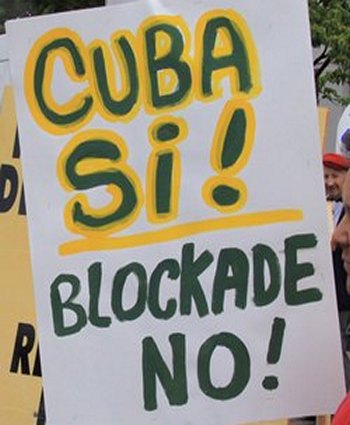 And now this! Is Canada so
attracted to the Trump
administration's anti-democratic counter-revolutionary attacks
against Venezuela's right to self-determination as to take its
revenge on Cuba? Or is it poised to admit that the United States
dictates Canadian policy? Shame on Canada either way. And now this! Is Canada so
attracted to the Trump
administration's anti-democratic counter-revolutionary attacks
against Venezuela's right to self-determination as to take its
revenge on Cuba? Or is it poised to admit that the United States
dictates Canadian policy? Shame on Canada either way.
Who will benefit from the closing of the Havana visa
service?
Not Cubans trying to have normal relations with Canada and
Canadians. What wrong has Cuba ever done to Canada?
The CNC calls on the Canadian government to reinstate
the
discontinued services at the IRCC Office in Havana, so that visa
processing may proceed in a reasonable manner. If the abrupt
shutdown is simply the result of the lack of necessary staff, as
the Ministry of Global Affairs asserts, then Ottawa should issue
a clear statement that visa and other related operations will
resume once staffing issues are resolved.
Canadians, thousands upon thousands of whom visit Cuba
for
many reasons including tourism, business, academic, political and
cultural exchanges of all kinds, want Ottawa to pursue a foreign
policy based on mutual respect and equality. The CNC is confident
that Canadians will reject any course of action taken by Ottawa
which undermines the long-standing diplomatic relations based on
norms recognized by the international rule of law and the ties of
friendship and solidarity that exist between the peoples of our
two countries.

On May 8, a Huawei executive issued a statement on
the steps
of
the BC Supreme Court following the latest hearing regarding the
Meng Wanzhou extradition case.
Benjamin Howes, Vice President of Media Affairs at
Huawei
said:
"From the outset, Huawei has expressed confidence in Ms.
Meng's innocence. We have maintained that her U.S.-ordered arrest
was an unlawful abuse of process -- one guided by political
considerations and tactics, not by the rule of law.
"Today in court, lawyers for Ms. Meng made three new and
important disclosures.
"First, the criminal case against Ms. Meng is based on
allegations that are simply not true. To the contrary, it was
made clear in court today that business activities by Ms. Meng
were conducted openly and transparently with full knowledge of
banking officials. The lawyers noted in court today that the
PowerPoint presented was not misleading, the bank had knowledge
of the nature of Skycom's business and operations in Iran, and
the bank understood the relationship between Huawei and Skycom.
Therefore, no evidence to prove that Meng committed acts of
"deceit, dishonesty, or other fraudulent means" or the bank was
placed at a risk of deprivation by relying on Meng's
Presentation.
"Second, it was revealed that actions directed in
part by the FBI led to serious and repeated violations of Ms.
Meng's rights under the Charter.
According
to
the
evidence
disclosed
by
the
Department
of
Justice
(DOJ) of Canada, the
arrest of Meng at the airport was a coordinated effort of three
departments: the Royal Canadian Mounted Police (RCMP), the Canada
Border Services Agency (CBSA), and the FBI. The RCMP
intentionally delayed the presentation of the arrest warrant in
order to carry out unlawful detention and search against Meng
under the pretense of a routine border check. Her luggage was
searched. Her cellphone and other electronic devices were seized
at the direction of the FBI -- and she was compelled to reveal her
passwords. More key evidence regarding this case remains in the
hands of the RCMP, the CBSA and the DOJ. Ms. Meng will apply to
the court, asking the RCMP, CBSA, and DOJ to disclose more
evidence on this matter.
"Third, it was revealed that the arrest
of Ms. Meng violated a core principle of the Canada-U.S.
Extradition Treaty and Canadian extradition law -- because the
allegation she faces is not a crime in Canada. The U.S. allegations
against Meng are based on violations of U.S. sanctions against
Iran. However, Canada does not impose sanctions on financial
services in relation to Iran. Therefore, the extradition request
does not satisfy the double criminality requirement.
"Furthermore, it was stated that political factors at
play
during the extradition process may lead to a serious violation of
justice. Ms. Meng's legitimate rights may also be harmed. Thus
Ms. Meng intends to apply to this Court for a stay of the
extradition proceedings.
"Canadians value the rule of law -- and the Charter of
Rights.
Law enforcement officials are expected to follow the rules at all
times, in all cases and for all people -- citizens and visitors
alike.
"We have trust in the Canadian judicial process -- and
we look
forward to seeing Ms. Meng's freedom restored."

Standing Up for Immigrant and Refugee
Rights in
the United States
- Voice of Revolution -
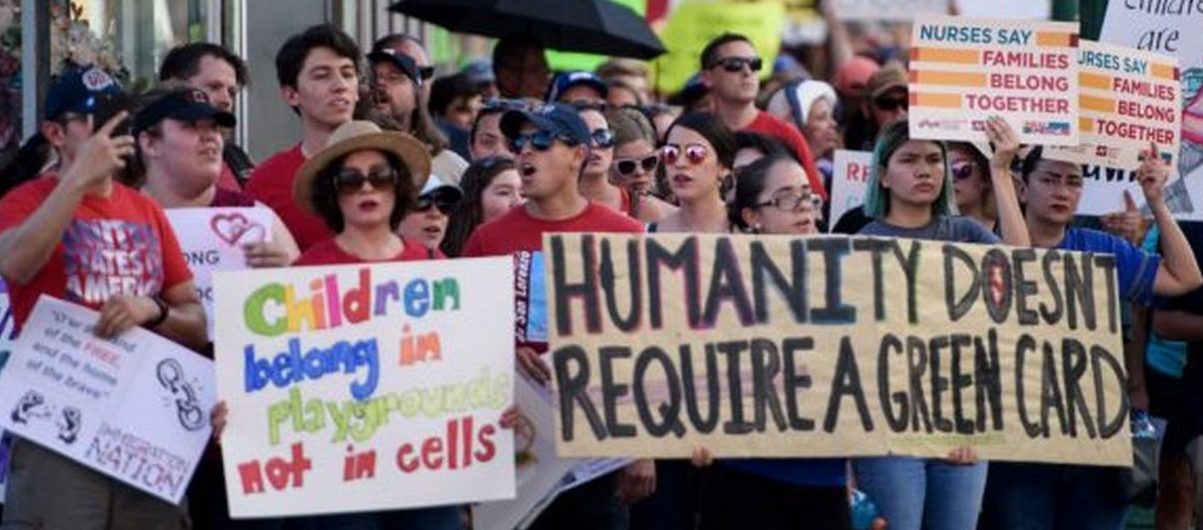
Students at Johns Hopkins University, in Baltimore,
Maryland, organized a month-long sit-in
demanding the university end all contracts with Immigration and
Customs Enforcement (ICE) and use the funds instead for an
immigrant defence fund. They also made the connection between ICE
repression in their communities and a university plan to have a
private armed police force. As their chants brought out, No
Justice, No Peace, No Armed Police! No Justice, No Peace, No ICE
in Our Streets! Communities in Wisconsin, Arizona and
elsewhere are also taking their stand against detention centres
and for the rights of migrant families. As well, asylum officers --
civil servants who are distinct from ICE and Customs and Border
Protection (CBP) and not an armed force -- are speaking out against new
protocols that are forcing people with legitimate claims and
fears back to Mexico. Many May Day actions also stood up for
immigrant and refugee rights, including the right to driver's
licences and other basic requirements of daily life. All are
standing up for rights and for a rule of law that actually
functions to the benefit of the people.
Contending with this growing resistance, the Office of
the
President is acting to further attack rights and eliminate rule
of law. In yet another presidential memorandum, Trump is acting
to block asylum seekers from obtaining work permits. Given that
the processing of asylum claims commonly takes at least six
months and sometimes years, given the current backlog, this is an
effort to starve people out even though they have committed no
crime and have the right to asylum. He is also demanding that a
fee be charged simply to apply, which would turn a right
into a privilege for those with sufficient funds.
In addition, Trump is demanding that all cases be
adjudicated
within 180 days. This is yet another attack on immigration
judges, who are already under quotas. Judges have spoken out
against these measures, saying it is robbing them of their
discretion and authority as judges to decide cases. Forcing
faster trials also undermines the ability of the migrants
involved to secure lawyers and prepare their cases. Both these
demands, and the Migrant Protection Protocols (MPP) issued in January,
are
undermining those judges and asylum officers trained in refugee law
and acting to uphold it.
The memorandum directs Attorney General William P. Barr
and Acting Homeland Security Secretary Kevin McAleenan to propose
regulations within 90 days that would enforce these demands. The
memorandum states the goal is "to strengthen asylum procedures to
safeguard our system against rampant abuse of our asylum
process." There is no evidence any such abuse exists. It is the
case that a large number of families are being forced to leave
their homes as their countries are engulfed in anarchy and
violence as a result of U.S. interference of various kinds,
especially in Honduras and El Salvador, where most migrants are
currently coming from. Thus more than 103,000 migrants crossed
the U.S.-Mexico border last month, the highest level in more than
a decade. About 60 per cent were Central American parents
travelling with children who, upon arrival on U.S. soil, wherever
they crossed, have the right to asylum.
While there is no evidence the migrants are abusing the
system, something confirmed by judges and asylum officers, there
is abundant evidence that refugees are being unjustly
criminalized and terrorized by the government -- with families
being separated, mothers and children detained for long periods,
minors being kept in cages and denied medical care such that children
are dying while in the care of CBP and ICE and people with just
claims being sent back to Mexico.
Trump and the government clearly have no solutions to
the
problems the U.S. state has created, both at home and abroad.
They refuse to defend rights while systematically eliminating
rule of law. Whether dealing with immigrants and refugees, with
police killings and brutality, or with issues of war and peace,
such as plans to now militarily invade Venezuela, the action taken is
the use of police powers, of which presidential memorandums are one
example. As further evidence of this, Trump is sending
hundreds more troops to the border with Mexico and has extended
their deployment indefinitely. Clearly there is a connection
between imperialist war, potentially against Mexico as well as
Venezuela, and the repression of ICE and armed police at home. A
government with no solutions and which refuses to modernize its
institutions can only rely on use of force.
As the growing resistance indicates, defending the
rights of
all is crucial at this time. A common aim for these struggles,
both against U.S. wars and interference and for rights, is an
anti-war government. An anti-war government upholds the rights of
all at home and abroad, brings all U.S. troops home, and stands
against war, interference and the genocide of police and military
killings. An anti-war government recognizes that democracy today
requires the people themselves to be empowered to decide these
vital issues and ensure that positive relations are developed
that serve the interests of the people at home and abroad.

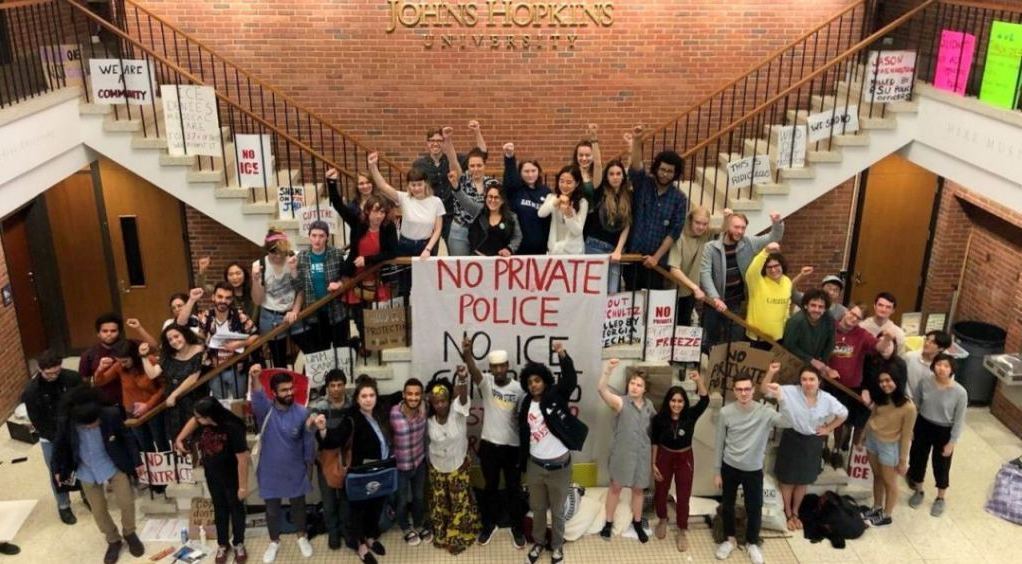
Students at Johns Hopkins University
organized a month-long sit-in of their campus administration
building, Garland Hall, to stand against the university's plans
for an armed campus police force and its contracts with
Immigration and Customs Enforcement (ICE). They demanded the
cancellation of ICE contracts, set to expire this year, and a
pledge that all money generated by previous contracts, about $1.7
million, would be donated to an immigration defence fund.
Students firmly rejected detention of asylum seekers and
criminalization of immigrants and demanded that their university
play no part in such crimes. Throughout the month-long sit-in the
voice of students could be heard loud and clear, "No Armed Police on
Campus! No ICE Contracts!"
One organizer of the sit-in explained, "Very dangerous
state
legislation has just passed, granting this university, which is a
repeat offender in terms of crimes against Baltimore city
residents, with police power. Seventy-five percent of the
students at Johns Hopkins said they did not want the police
force. Several community associations, primarily across
Baltimore, also said that they did not want this armed force.
"There was a letter written by 100 faculty members to
the
administration who also said they wanted to disarm, de-escalate,
de-fund this machine of force that was going to happen. They
called for other solutions and investment and things like
mediation and community-driven alternatives to policing. As a
public health institution, Johns Hopkins University knows better
and knows that more policing does not equate with less crime, but
that more policing actually causes more anxiety and public health
concerns around communities, causes the extraction of wealth from
communities and also normalizes state-sanctioned violence and
terror against black and brown bodies across the U.S."
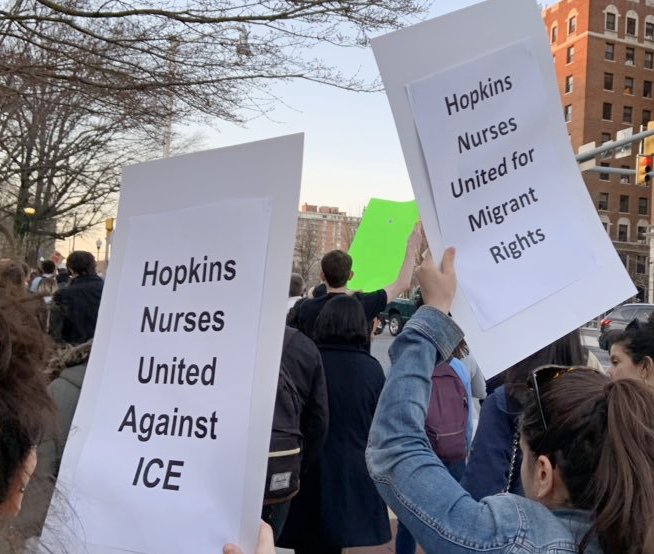 The faculty passed a
unanimous resolution in support of the
students. Community support grew over the course of the sit-in,
with community organizations and church groups visiting students
and publicly expressing their support. With this support, the
students raised more than $2,700 for food and other
necessities. The faculty passed a
unanimous resolution in support of the
students. Community support grew over the course of the sit-in,
with community organizations and church groups visiting students
and publicly expressing their support. With this support, the
students raised more than $2,700 for food and other
necessities.
President Daniels repeatedly refused to meet with
students
about their concerns unless they left the administration
building. Instead, students put leaflets and banners up and
organized meetings and various events to inform their fellow
students and all concerned about the need to block an armed
police force on campus and to reject any relations with ICE. They
made a clear connection between the use of force against
immigrants at the border with Mexico and use of force against
students, especially minorities, who are routinely brutalized and
profiled. Baltimore police are already known for their killing of
unarmed African Americans. Students have no doubt a private armed
police force on campus, unaccountable to the public, would be even
worse.
They pointed to the on-going struggle in Baltimore for
justice
for Tyrone West, an African American killed by police from Morgan
State University in July 2013. Morgan State's private armed force
is being used by Johns Hopkins as the model for its force.
Students and the community are also well aware that in the last
several years, campus police officers have used racist profiling
and force in handling incidents, including those involving
students with mental health issues. These are warranted concerns
in light of an incident in April where an African American
couple, unarmed and fully compliant during a traffic stop, were
shot and injured by police, including an officer from Yale's
police department.
Students rejected the administration claims that armed
police
would make the campus more safe. Many women students said
investigating sexual assaults on campus, for example, would do a
lot more to provide for the safety of students.
The university also threatened students with
disciplinary actions. They refused to put anything in writing in regard
to the concerns raised, but did create a paper trail for "violations"
by the students, "to pursue disciplinary actions against students as
soon as the sit-in is over," as one organizer put it. "We've heard
reports that the Dean's Office has been calling faculty members,
especially faculty members who are in more precarious positions, and
threatening them, to discourage them from supporting the sit-in," the
student said. Anyone who is stepping in the space is also being pursued
and surveilled in these ways, which is extremely alarming and which
actually gives credibility to our concerns about what Hopkins would do
with its own private, armed police force on campus and beyond and in
the community."
The administration also refused a student and faculty
proposal
for mediation to address their concerns and resolve the problems.
It also rejected calls from students and faculty for
more public meetings so that people in the community could voice
their concerns about ICE, police profiling and killings, and
alternatives to use of force.
On May 1, after weeks of the administration's refusals
to
meet, the students shut down Garland Hall, chaining the doors
shut and chaining themselves to railings and staircases inside.
They left open the door to the president's office. Posters and
leaflets were put up on the windows and doors throughout the
building, detailing their concerns. A large banner on the
staircase read, "No private police. No ICE contracts. Justice for
Tyrone West."
 
On May 5, President Daniels said he would meet with
students,
but only outside the building, which most saw as a ploy to
demobilize them. Students called for a neutral, mutually
agreed-upon mediator to conduct the negotiations. They demanded
that students, professors and staff who participated in the
protests not be punished, and to be let back into the building
and not be arrested if the talks went awry.
Daniels refused and called in the police to clear the
building. A force of more than 80 police descended on the
building. Seven students were arrested. As they were forced out,
students' militant chants made clear they will continue to
fight.

Community opposition to plans for the first privately
run
immigration detention centre in Wisconsin has resulted in the
proposal, in the works for the past year, being withdrawn in
May. Virginia-based Immigration Centers of America had
wanted to build a 500-bed detention centre it claimed would
generate more than 200 full-time jobs and millions of dollars in
state and local tax revenue.
The Milwaukee Journal-Sentinel reports that
companies
that build such centres are being encouraged by federal officials,
but resisted at the state and local levels. The newspaper reported:
"Public outcry over the plan was fierce, with residents
opposing the detention of immigrants, and expressing concerns
about use of tax dollars and property values. The city's staff
had issued a report recommending officials reject the application
for rezoning and related ordinance changes, saying the project
did not fit in the city's development plan.
"After the St. Croix plans were made public in early
April, a
wave of public rejection spread through the area. St. Croix
County Supervisor Daniel Hansen, who represents some New Richmond
wards, was one of the first to organize opposition against the
center. He said he believes it is immoral to incarcerate those
who are fleeing their country and trying to seek refuge in the
U.S."
"I feel it's inhumane to treat an asylum-seeker like a
criminal," Hansen said. He contacted advocacy groups, ordered
signs opposing the project and prepared a list of reasons why he
thought the project would be bad for the city. He knocked on
doors, called friends and reached out to others to build a
campaign. He said both Democrats and Republicans were against the
project.
Other groups in Wisconsin also organized to stop the
project,
including the American Civil Liberties Union-Wisconsin and
immigrant advocacy group Voces de la Frontera. "This is a
for-profit business that is making money out of discrimination
and breaking up families and our economy," said Christine
Neumann-Ortiz, Executive Director of Voces de la Frontera. "This
has no place in Wisconsin."
New Richmond Alderwoman Scottie Ard lost count of the
number
of calls she received opposing the project, adding, "Most of the
callers had not only a moral objection to a detention center, but
they also have the objection that this is not what we want our
community to be known for."
The number of those being detained by ICE has rapidly
increased since fiscal year 2016, when ICE held an average of
34,376 immigrants on any given day. The average for this fiscal
year, as of March, was 45,155, said ICE spokeswoman Nicole
Alberico.
Nonetheless, the Journal-Sentinel points out,
that
"even in counties like St. Croix that voted for Donald Trump,
[...] plans have not worked out. Immigration Centers of America,
which owns a detention facility in Virginia, also has been trying
to secure two multimillion-dollar federal contracts to open
detention centers in Illinois and Michigan.
"The company has run into opposition there, too.
"Michigan Governor Gretchen Whitmer canceled earlier
this year
the sale of a shuttered state prison in Ionia that the company
hoped to use as a detention center, saying the company could not
guarantee it would not be holding adults separated from their
children at the border. [Immigration Centres of America] spokesman John
Truscott said the
company is looking at other options near Detroit.
"In Illinois, the Village of Dwight board voted in favor
of
the company's request to annex a property where they plan to
build a 1,200-bed immigration detention center in March despite
the opposition of immigrant advocates. But the plan may yet be
blocked, as state lawmakers are pushing for legislation banning
private detention centers. The bill passed the Illinois House in
early April."
Fred Tsao, with the Illinois Coalition for Immigrants
and
Refugee Rights, said immigrant detention is cruel and
unnecessary. "One can make a detention facility as nice as you
can, but it's still a jail, it's still a prison," he said.

Phoenix, Arizona is one of the main cities where
Customs
and
Border Protection (CBP) and Immigration and Customs Enforcement (ICE)
are releasing migrant families awaiting asylum claims, often with
no food or water. Sometimes the families, many with young
children, are just dumped at the bus station and left to fend for
themselves. Many people in Phoenix active in defending the
migrant families felt this was a way to further terrorize the
families while overwhelming those organizing against detentions
and deportations and for the right to asylum. But the Phoenix
community responded by stepping up their efforts, organizing a
wide network of 30 churches and other facilities to house and
feed about 1,400 migrants a week, many of them families with
young children. Generally, families released in Phoenix only stay
about a week until transportation is available to reach their
sponsors or family members in other cities.
 Recently, in what appears to be a
direct effort by CBP
and ICE
to undermine the organizing efforts, many migrant families are
now being released in nearby Yuma. Yuma is a city of about
100,000, with one migrant shelter housing 200 people. Officials
there were told the shelter was only to serve as an "overflow"
for migrants who could not be released at shelters in
Phoenix. Recently, in what appears to be a
direct effort by CBP
and ICE
to undermine the organizing efforts, many migrant families are
now being released in nearby Yuma. Yuma is a city of about
100,000, with one migrant shelter housing 200 people. Officials
there were told the shelter was only to serve as an "overflow"
for migrants who could not be released at shelters in
Phoenix.
Since October, the Border Patrol had been transferring
migrant
families detained in Yuma to ICE, which then transported them to
Phoenix. But at the end of March, the arrangement suddenly
changed and CBP began transferring fewer families to ICE custody
and instead began releasing them in Yuma.
In April, Yuma Mayor Douglas Nicholls was forced to
declare a
state of emergency to deal with the flood of migrant families
being released by CBP. Meanwhile, Phoenix saw a significant
decrease in families and the hundreds of beds available were
going empty. Organizers say the government is purposely creating
chaos and striving to make conditions more difficult for migrants
and communities alike.
Another example involves St. Vincent De Paul in Phoenix.
In
late March, the church agreed to let ICE release up to 100
migrants daily at one of its dining halls to provide a safe place
for them to stay during the day until they could be driven to
local churches to spend the night. The opening of the dining hall
was intended to prevent ICE from dumping large groups of migrant
families at the Greyhound bus station, or on the street, as the
agency had done on several occasions before the network of
churches had been developed.
But just two days after the St. Vincent De Paul dining
hall
opened to migrant families, the CBP announced it had started
releasing migrant families in Yuma instead. CBP is also releasing
families in Blythe, a city of only about 20,000 on the Arizona
line. They are doing so even though many of the migrant families
released in Yuma and Blythe are headed to cities in Eastern
states, and must pass through Phoenix anyway. Yet CBP and ICE are
organizing to not bring them to Phoenix.
Data provided by Lutheran Social Services of the
Southwest,
one of the main defenders of migrant families in Phoenix, shows
that during the 11-day period from April 14 to April 25, the
number of migrants released by ICE in Phoenix fluctuated between
50 and 234 daily. On all but one day during that period, the
number of migrants released by ICE fell far below capacity at the
nearly 30 churches currently providing shelter on a rotating
basis.
For example, on April 25, ICE released 70 migrants in
Phoenix
on a day when the capacity at local churches was 220. So far this
fiscal year, the Border Patrol has seen a 374 per cent increase
in the number of migrant families arriving at the border compared
to the same period last year, from 39,975 to 189,584, according
to CBP data.
In the Border Patrol's Yuma sector, apprehensions of
migrant
families have increased 273 per cent so far this fiscal year,
from 6,487 to 24,194, the data shows. ICE released 153,000
between December 21 and April 22, according to statistics
provided by the agency. Of those, 26,700 were released by ICE in
Arizona, 14,800 in San Diego area, 49,300 in El Paso area and
62,200 in the San Antonio area.
Immigrant rights organizers emphasize that migrant
families
are fleeing horrendous conditions in their home countries, often
created by U.S. interference, and have a legal right to pursue
their asylum case in the U.S. Many also feel ICE and CBP are
acting in a manner to justify further attacks on migrant families
and at the border more generally. "I think the broad goal in all
of this is to create the impression that our country is under
siege by refugees from Central America," said an attorney who is
executive director of Refugee Aid. The Phoenix-based non-profit
collects food, clothing and other necessities to distribute to
migrants released by ICE and some volunteers also host migrant
families in their homes.
Layal Rabat, a spokeswoman for the Phoenix Restoration
Project, another community group helping migrant families, feels
the Trump administration is intentionally creating chaos in
border communities to provide ammunition to attack the Flores
agreement, a court-settlement that prevents the federal
government from holding migrant families who ask for asylum for
more than 20 days. She also worries that the Trump administration
is trying to justify plans to build large detention facilities to
hold migrant families indefinitely by creating chaos in border
communities.
In Phoenix, as in El Paso, San Antonio, San Diego and
many
other cities contending with government attacks on migrant
families, people are rejecting these efforts to justify further
criminalization and dehumanizing of people and instead stepping
up efforts to defend the rights of all.

The Trump administration launched what it terms its
Migrant
Protection Protocols (MPP) program in January and has been
expanding it ever since. MPP sends people seeking asylum back to
Mexico to wait while their claim is processed through the
immigration courts, something which commonly takes at least six
months and often years. Previously, people would be released to
family members already in the U.S. or sponsors like churches and
community organizations. The program directly involves asylum
officers, who are trained to determine if people seeking asylum
have a reasonable fear of being persecuted, tortured or killed if
they are returned to their own countries.
 This corps of asylum
officers is not an armed force and is
distinct from Customs and Border Protection (CBP) and Immigration and
Customs Enforcement (ICE). One of their main jobs is to ensure
the U.S. is upholding international and U.S. law concerning
refugees. This includes the fundamental principle of refugee law
called non-refoulement -- that a government must not send a
migrant back to a country where they would be persecuted or
imperilled. This corps of asylum
officers is not an armed force and is
distinct from Customs and Border Protection (CBP) and Immigration and
Customs Enforcement (ICE). One of their main jobs is to ensure
the U.S. is upholding international and U.S. law concerning
refugees. This includes the fundamental principle of refugee law
called non-refoulement -- that a government must not send a
migrant back to a country where they would be persecuted or
imperilled.
Asylum officers are being forced to play a very
different role
under the MPP process. Trump's MPP program is eliminating these
officers' discretion and creating difficulties for Central American
asylum
seekers, who, when rejected, are sent back to Mexico, not their
home countries. Under these protocols, the Trump administration
has started sending these asylum seekers back to
Mexico after initial processing -- first a handful a week, then
dozens, now hundreds -- with instructions to show up at a port of
entry at a particular date for a hearing before an immigration
judge on their asylum case. Lawyers and human rights advocates
say there is no way for immigrants to obtain U.S. lawyers while
in Mexico; that they may not be able to return to the U.S. in
time for their hearings; that northern Mexico is not necessarily
a safe place to be for Central Americans fleeing persecution; and
thus the U.S. is violating the principle of non-refoulement.
Asylum officers are speaking out against MPP and the
current
process where their discretion is being eliminated and people
with legitimate fears about staying in Mexico are being sent
back. Many asylum officers think that their personal integrity
and that of their office is at stake. They worry that they are
being used to whitewash the program, and do not have as much
power to allow migrants to stay in the U.S. if they are in danger
as the Trump administration claims they do.
Under the new rules, officers effectively have no power
to
decide whether asylum seekers can stay in the U.S. to await an
asylum hearing. One officer described the interviews as just for
show. Another officer explained that he had listened to a Central
American's story of threats from drug cartels during his journey
through Mexico en route to the U.S., and believed the man's life
was in danger. Yet under MPP he "wasn't even allowed to make an
argument" that the asylum seeker should be allowed to stay in the
U.S. to pursue his case.
Normally, after a screening interview, the officer
summarizes
the facts of the case and reads them back to the applicant. Then
the officer writes up a legal analysis as to whether the
interviewee is describing persecution (of a specific ethnicity,
nationality, political opinion, religion, or "particular social
group") or torture, and how likely it is that they would face
such persecution or torture if returned to their home country.
Typically the interviewee must show "credible fear" of torture of
persecution, a standard designed to err on the side of
non-refoulement. The officer submits the legal analysis with
their final ruling on whether the interviewee should be allowed
to avoid deportation and seek legal status in the U.S.
Under MPP, the traditional screening standards no longer
apply. Instead, migrants have to show that they are "more likely
than not" to face persecution in Mexico in order to be kept in
the U.S. before their hearings. That is a higher standard than
either "credible fear" or "reasonable fear" and not one which asylum
officers are familiar with. The officers say that in practice, it
is all but impossible for applicants to meet this standard. The
legal standard requires such specific and persuasive testimony
that no one can satisfy that burden, they say.
Moreover, as one officer put it, asylum seekers are
"scared,
unprepared, exhausted" -- and do not understand they could be
sent back to Mexico. As well, CBP
agents, typically the first U.S. immigration authorities that
these asylum seekers encounter when they cross into the U.S., do
not ask asylum seekers whether they are afraid of being returned
to Mexico, and will only refer them to an asylum officer if they
voluntarily mention they are afraid of return. CBP agents have
told asylum officers that they are "instructed not to ask" about
fear of return to Mexico. One CBP agent told an asylum officer,
"We don't want to spoon-feed them" anything that would facilitate
them seeking asylum.
Asylum officers said interviewees did not understand why
they
were being asked about Mexico and only stress that they are
afraid of being returned to their home country. They seem to know
far less about Mexico than the officers interviewing them,
meaning they cannot give detailed enough answers to make a
persuasive case to stay in the U.S.
As one officer emphasized, exhausted and confused
immigrants
simply "don't have the tools" to give that testimony and satisfy
doubts about whether they would face persecution in Mexico. They
certainly do not have the ability to articulate a "particular
social group" they were being targeted as a member of.
Under MPP, asylum officers are not being asked to
synthesize
answers or provide any legal analysis; they are just checking
boxes on a form and submitting it to their supervisors for
review. The training asylum officers are given to elicit
testimony and translate it into legal language has been cast
aside.
As a result, approvals are rare. The ones that are
granted are
scrutinized by higher-ups. Normally, if a supervisor disagrees
with a final decision, they can ask the asylum officer to go back
and redo it. The head of the officers' union, who has been an
asylum officer since the creation of a dedicated asylum corps in
the early 1990s, has had only three cases where a supervisor
disagreed with his assessment, and "in none of those cases," he
says, "was I forced to do something I didn't believe in."
Under MPP, officers said that decisions to let an asylum
seeker stay are often reviewed and blocked or overturned by
asylum headquarters. Officers have also reported that a
supervisor was told not to issue any positive MPP decisions
without checking with the other officers on their team, and with
headquarters. In two cases, officers said that both the asylum
officer conducting the interview and the supervisor agreed that
an interviewee who had been kidnapped by cartels while travelling
through Mexico should not be sent back, but headquarters
overruled them.
The asylum corps already considered their authority
as a
trained force was being eliminated while asylum law was being
violated. They have also had to implement other Trump administration
decisions, for example those eliminating domestic and gang
violence as a basis for claims.
Asylum officers are also concerned that they will be
replaced.
The Trump administration recently issued orders for yet more
restrictions and higher requirements. The president and DHS are
also reportedly laying the groundwork for CBP agents -- who are
assumed to be "tougher" on migrants and have no training
concerning refugees -- to conduct those interviews instead. The
asylum officers know that CBP is not in a position to uphold
refugee law, and that removing them is part of the whole process
now underway to undermine international law. Many want no part of
it and certainly do not want their names used to justify these
attacks. More and more are speaking out and demanding that
refugee law and their authority to determine eligibility for
asylum be respected.
A federal court temporarily blocked the new MPP policy
of
forcing asylum seekers to return to Mexico and remain there while
their cases are considered. However, an appeals court issued a
stay, so the program remains in force.

Illegal Economic Sanctions as Collective
Punishment
- UN Office of the High Commissioner on
Human Rights -
An independent expert appointed by the Human Rights
Council [of the United Nations] has expressed deep concern at the
recent imposition of unilateral coercive measures on Cuba, Venezuela
and Iran by the United States, saying the use of economic sanctions for
political purposes violates human rights and the norms of international
behaviour. Such action may precipitate man-made humanitarian
catastrophes of unprecedented proportions.
"Regime change through economic measures likely to lead to the denial
of basic human rights and indeed possibly to starvation has never been
an accepted practice of international relations," said Idriss Jazairy,
the UN Special Rapporteur concerned with the negative impact of
sanctions. "Real concerns and serious political differences between
governments must never be resolved by precipitating economic and
humanitarian disasters, making ordinary people pawns and hostages
thereof."
 The implementation of Title III of
the Helms-Burton Act --
allowing U.S.
citizens to file lawsuits against Cuban entities and foreign companies
over property seized and used following Fidel Castro's 1959 revolution
-- ignored protests by the European Union and Canada and was a direct
attack on European and Canadian companies in Cuba, where they are the
top foreign investors. The implementation of Title III of
the Helms-Burton Act --
allowing U.S.
citizens to file lawsuits against Cuban entities and foreign companies
over property seized and used following Fidel Castro's 1959 revolution
-- ignored protests by the European Union and Canada and was a direct
attack on European and Canadian companies in Cuba, where they are the
top foreign investors.
"The resort by a major power of its dominant position in the
international financial arena against its own allies to cause economic
hardship to the economy of sovereign States is contrary to
international law, and inevitably undermines the human rights of their
citizens," the Special Rapporteur said.
On 17 April the United States banned the Central Bank of Venezuela from
conducting transactions in U.S. dollars after 17 May, and will cut off
access to U.S. personal remittances and credit cards by March 2020.
"It is hard to figure out how measures which have the effect of
destroying Venezuela's economy, and preventing Venezuelans from sending
home money, can be aimed at 'helping the Venezuelan people', as claimed
by the U.S. Treasury," the expert said.
His statements follow claims in a recent report published by the
Washington-based Centre for Economic and Policy Research that 40,000
people may have died in Venezuela since 2017 because of U.S. sanctions.
Jazairy also said he was concerned the U.S. would not renew waivers for
international buyers of Iranian oil, despite protests from NATO ally
Turkey, among others. Washington has demanded that all remaining States
which benefited from waivers stop purchases on May 1, or face sanctions.
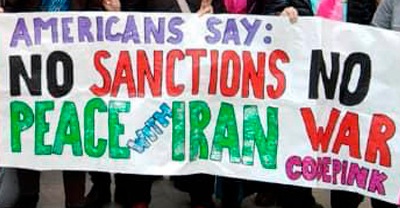 "The extraterritorial application
of unilateral sanctions is clearly
contrary to international law," the expert said. "I am deeply concerned
that one State can use its dominant position in international finance
to harm not only the Iranian people, who have followed their
obligations under the UN-approved nuclear deal to this day, but also
everyone in the world who trades with them. "The extraterritorial application
of unilateral sanctions is clearly
contrary to international law," the expert said. "I am deeply concerned
that one State can use its dominant position in international finance
to harm not only the Iranian people, who have followed their
obligations under the UN-approved nuclear deal to this day, but also
everyone in the world who trades with them.
"The international community must come together to challenge what
amounts to blockades ignoring a country's sovereignty, the human rights
of its people, and the rights of third countries trading with
sanctioned States, all while constituting a threat to world peace and
security.
"I call on the international community to engage in constructive
dialogue with Venezuela, Cuba, Iran and the United States to find a
peaceful resolution in compliance with the spirit and letter of the
Charter of the United Nations before the arbitrary use of economic
starvation becomes the new 'normal.'"

71st Anniversary of Al Nakba
 

- Nick Lin -

Israeli bombardment on Gaza May 4, 2019 kills 14-month-old girl and
pregnant woman.
The people of Gaza were once again assaulted from May 3
to 5, as the brutal 12-year siege by Zionist Israel and its occupying
military forces continues. Twenty-seven Gazans have died and at least
154 have been injured due to the Israeli assault. The aggression got
underway Friday, May 3, after Israeli forces killed four Palestinians,
two in an air raid on southern Gaza and two in an attack on protesters
taking part in the weekly Great March of Return actions near the border
fence separating Gaza from the Occupied Territories. A ceasefire was
reached on May 6 that has brought the Israeli aggression and
Palestinian acts of resistance and self-defence to an end for the time
being. It is said to include conditions that require Israel to mitigate
the siege of Gaza.
As usual, Israel justified its aggression in the name of
"self-defence" claiming two of its soldiers near the fence were
wounded by Palestinian gunfire on May 3. However, it is
well-documented that for more than a year, Israeli forces have
regularly attacked and killed unarmed protestors taking part in
the Great March of Return, as well as clearly identified medical
personnel and journalists at these protests, with utmost
disregard for human life.
This latest attack on Gaza underscores once again the
need for
all peace- and justice-loving people to stand with the heroic
people of Palestine and Gaza in their just resistance to the
illegal Israeli occupation and its war crimes.

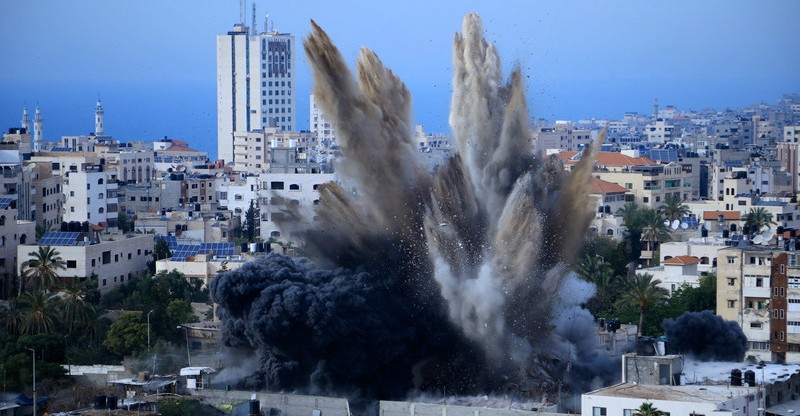
Israeli bombardment of Gaza, May 5, 2019.
Hours before the announcement of a mutual ceasefire
between
Palestinian armed groups and Israel [on May 6], the Israeli
forces intensified their aggression against the Gaza Strip at a
high rate for two consecutive days during which the Israeli
forces carried out intensive bombardment through their warplanes
and artillery shells in land and sea, targeting more multi-story
buildings and houses in a clear violation against Palestinian
civilians.
As a result, hundreds of families became homeless and
two million Palestinians suffered fear and terror. Moreover, the
Israeli forces continued using the extrajudicial executions policy,
which has been going on in recent years. Focusing on targeting
residential buildings and houses on the second day of the offensive,
the Israeli forces began their aggression the way they ended their
aggression in 2014 in which they randomly destroyed dozens of
residential buildings on the heads of their inhabitants.
Following the press release issued by the Palestinian
Center
for Human Rights (PCHR) on Saturday, May 4, 2019 and according to
fieldworkers' documenting the incidents of the second day, the
Israeli forces' bombardment resulted in the killing of 23
Palestinians. Fourteen of them were civilians; including three
women and three children. Some of those killed inside their
houses were from the same family. Moreover, 44 others were
injured. Thus, the total number of killed Palestinians has risen
to 23, including three women, one of whom was pregnant, and three
children, including a baby girl.
 The airstrikes targeted 20 residential
houses, a
residential
building and a mosque; three workshops; 20 targeted empty land,
cars, motorbikes, resorts, and other public and private property,
in addition to training sites and border control points belonging
to Palestinian armed groups. In addition to the artillery
shelling that took place in various areas of the eastern Gaza
Strip. [The Palestine News Network reported on May 7 that more
than 130 residential apartments were completely destroyed, while
700 others were partially destroyed in the Israeli attacks. --
TML Ed. Note.] The airstrikes targeted 20 residential
houses, a
residential
building and a mosque; three workshops; 20 targeted empty land,
cars, motorbikes, resorts, and other public and private property,
in addition to training sites and border control points belonging
to Palestinian armed groups. In addition to the artillery
shelling that took place in various areas of the eastern Gaza
Strip. [The Palestine News Network reported on May 7 that more
than 130 residential apartments were completely destroyed, while
700 others were partially destroyed in the Israeli attacks. --
TML Ed. Note.]
For the first time since 2014, Israeli forces committed
a new crime of extra-judicial execution, the killing of Ahmed
al-Khudari after targeting his car in the center of Gaza City.
According to PCHR's investigations, at approximately
14:45 on Saturday, May 5, 2019, the Israeli warplanes launched a
missile at a car driven by Hamed Ahmed Abdul Khudaria, from Tuffah
neighborhood in Gaza City, killing him. Hamed was driving his car in
the vicinity of al-Sedrah area in al-Tuffah neighborhood, east of Gaza
City.
At approximately 22:10 on Saturday evening, May 4, 2019,
Israeli drone fired a missile at a group of civilians, who were
in the vicinity of the American School former site, west of Beit
Lahia, killing Khalid Mohammed Selmi Abu Qaliq (24), from the
city, after he was hit with shrapnel throughout his body.
Moreover, another civilan was seriously injured.
At approximately 17:35 on Sunday evening, the Israeli
forces
fired an artillery shell at a house belonging to Abdul Rahim
Mustafa al-Madhoun (60), south of the American School, west of
Beit Lahia. As a result, the house was destroyed and four
civilians were killed, including a woman, and nine were
injured.
Those killed civilians, including Abdul Rahim, were
identified
as: Abdul Rahim's son Abdullah Abdul Rahim Mustafa al-Madhooun
(21), Fadi Ragheb Yusuf Badran (33), Amani 'Etfat Sha;ban
al-Madhoun (36), who was pregnant at her ninth month.
Furthermore, nine civilians were injured, including six children.
Doctors classified the injuries of two of them as serious.
At approximately 17:45, the Israeli warplanes launched
two
missiles at the ground floor and first floor in Zu'rob's Building
near al-Shuhada'a Square (al-Nejmah), in the center of Rafah. As
a result, 3 civlians were killed namely: 'Ali Ahmed Abdul Jawad
(51), who was in al-Awa'el Educational Center, Mousa Husein Lafi
Mo'amer (35) and Hani Hamdan Abu Sha'ar (37), who were at
al-Fakher Cafe. Moreover, 4 civilians, including a child were
sustained various wounds.
At approximately 19:50, Israeli warplanes launched a
missile at the fifth floor in Building No. 12 of the Sheikh Zayed
Buildings, north of the Gaza Strip. As a result, six civilians
were killed namely: Ahmed Ramadan Rajab al-Ghazali (30), his wife
Eman Abdullah Mousa al-Ghazali (29), their child Maria (5
months), Abdul Rahman Talal Abu al-Jedyan (12), his parents Tala
'Atiyah Abu al-Jedyan (48) and Raghdah Mohammed Abu al-Jedyan
(46), whose dead bodies were recovered this morning [May 6] from under
the rubble. Moreover, nine civilians living in the same building
sustained minor and moderate injuries.
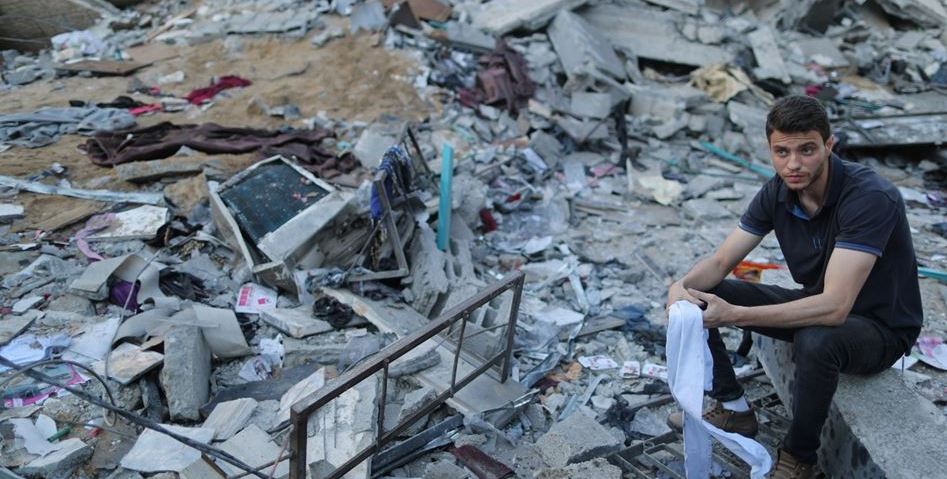
Palestinian schools damaged in the most recent Israeli bombardment.
The ongoing Israeli offensive disrupted all schools and
universities, preventing tens of thousands of students from heading
to their schools and universities. Moreover, several Governmental
and non-Governmental Organizations (NGOs) were disrupted as well.
Thus, obstructing the Palestinian civilians' lives and businesses
and undermining their basic rights. [Ma'an News Agency
reported that 13 schools were severely damaged. -- TML Ed.
Note.]
Furthermore, Israeli forces issued a decision to close
all
crossings from and to Israel, stop the entry and exit of goods,
prevent the movement of members, including patients, as well as
prevent the entry of fuel into the Gaza Strip.


The Let Issam Stay Campaign is once again calling on the
people
of Canada to stop the deportation of Issam Al Yamani. Issam Al
Yamani is a Palestinian who has lived in Canada for over 30
years. He immigrated to Canada in 1985 and was granted permanent
resident status. He was denied citizenship in 1988 and has since
been persecuted by the Canadian government, up to and including
attempts at deportation, because of his staunch support for the
just cause of the Palestinian people.
The Let Issam Stay Campaign was established to call on
the
people of Canada to write to the Minister of Public Safety, Ralph
Goodale, asking him to grant a ministerial relief for Mr. Al
Yamani. The Campaign has recently learned that Minister Goodale
has denied this ministerial relief request. The Campaign is
preparing to take the next step by launching a formal legal
appeal to the Minister's decision.
It has issued the following appeal:
One year ago we wrote to inform you that the Canadian
Border
Services Agency (CBSA) had recommended to the Minister of Public
Safety (Ralph Goodale) that he deny Issam Al Yamani's request for
Ministerial Relief from threat of deportation to statelessness.
Thanks to your efforts, Minister Goodale received more than 200
letters of unwavering support, asking Minister Goodale to act
fairly by granting Issam the ministerial relief he rightly
deserves.
Now, with much disappointment and frustration, we are
writing
to inform you that the Minister has denied ministerial relief to
our friend Issam Al Yamani. In doing so, he has denied justice to
Issam by putting in jeopardy his right to continue to live in
Canada, which is his only home.
This decision has been made despite the fact that
nothing
substantive has changed:
The truth remains that Issam is and has been a
law-abiding resident of Canada and an active member of his
community for more than 30 years. He has never been charged or
convicted of breaking the law, and the Minister has not
substantiated the unfair claim that Issam's presence is a danger
to the security of Canada.
The truth remains that the CBSA itself confirmed (in a
July
14, 2014 assessment) that Mr. Al Yamani did not constitute a
danger to the national security of Canada. In a letter to
Minister Goodale dated July 4, 2017, the Ontario Civil Liberties
Association (OCLA) also affirms that, far from being a threat to
the national interest, "Mr. Al-Yamani is a model of civic and
political engagement".
The truth remains that Issam Al Yamani is being unjustly
and
unfairly penalized for exercising pro-Palestinian views that any
Canadian would be legally allowed to express. It is Issam's right
to the freedom of expression that appears to be the reason for
the denial of ministerial relief. Specifically, the Minister did
not like Mr. Al Yamani's statements made at a rally on July 30,
2014 in support of the Palestinian people during the time that
Israel was bombing Gaza.
Of course, we will not let the struggle for Mr. Al
Yamani's
rights end here. The next step is a formal legal appeal to
the Minister's decision, and it will be costly. We need your help once
more. At this time we are asking
you to
make a donation to support the legal expenses that will be
required to win this appeal.
Our target fundraising goal at this time is $10,000. All
donations -- however small or large -- will be needed, deeply
appreciated, and will go directly to legal expenses in this
effort to win the appeal.
Donate through Paypal or credit card here
Mail a donation
cheque to:
Let Issam Stay Campaign
PO Box 494
Station
P
Toronto, ON M5S 2T1
Make cheques payable to "Barbara
Jackman and Associates"
While the legal system moves slowly, we will provide
updates as soon as information becomes available. And we will keep
you informed of other ways in which you can continue to show your
support to Issam as he continues to fight for justice. If you
have any questions or concerns, please email
letissamstay@gmail.com.
In solidarity,
Let Issam Stay Campaign

74th Anniversary of Victory over Fascism
in
Europe
 Immortal Regiment march in Montreal, May 9, 2019. (G. Proulx) Immortal Regiment march in Montreal, May 9, 2019. (G. Proulx)
On May 9, 1945, Nazi Germany surrendered to the Soviets
in
Berlin. Since then, May 9 marks the victory of the Allied forces
over fascism in World War II. On this occasion, the Communist
Party of Canada (Marxist-Leninist) salutes all Canadians who
contributed to the victory against fascism. It salutes the
peoples of Europe, Asia and the entire world who contributed to
this historic victory. Most importantly, it recognizes and
salutes the courage and sacrifice of the Soviet Union, whose
people rose as one and broke the back of the Nazi war machine at
tremendous cost. CPC(M-L) pays deepest respects to the memory of
all those from the occupied countries who fought and died as a
result of the Nazi onslaught and thanks the resistance fighters
who worked as one to defeat the fascist occupier. All of them
fought for peace, freedom and democracy so that humanity would
never again know the scourge of fascism and war.
Canada, joined by then-British colony Newfoundland,
played its
part by sending 1.1 million troops to fight in the war, including
more than 130,000 Quebeckers. They distinguished themselves in
many battles and campaigns, particularly in the Normandy
landings, the Italian campaign and the liberation of Holland.
 Today, this anniversary
calls on everyone to once again
take a
stand that these times require -- to oppose wars of aggression
and occupation and the use of force to resolve conflicts between
nations, so that the dangers of another world war and other
calamities that threaten humanity in the most profound ways can
be prevented. Today, this anniversary
calls on everyone to once again
take a
stand that these times require -- to oppose wars of aggression
and occupation and the use of force to resolve conflicts between
nations, so that the dangers of another world war and other
calamities that threaten humanity in the most profound ways can
be prevented.
Let us together take up the discussion of how to Make
Canada a
Zone for Peace so that Canada becomes a force for peace
and the international rule of law, not an instrument of the U.S.
imperialist striving for world domination. Canada's political and
economic integration into the U.S. war machine must be ended. The
role Canada is playing internationally as a henchman for U.S.
imperialist aggression, as seen today in its role to foment
regime change in Venezuela and appease U.S. policy against Cuba, is not
acceptable. On May 9, 2019, we honour the memory of all
those who fought to defeat fascism by working to make Canada a
zone for peace! All out to humanize the natural and social
environment and Make Canada a Zone for Peace!

Around the world, since 2012, veterans who fought in
WWII
and their descendants take part in processions to commemorate the
memory of their relatives, known as the March of the Immortal
Regiment. The website Russia Beyond informed on May 8 that the
march "originally began in 2012 in the Siberian city of Tomsk,
but this year, the Immortal Regiment is held in more than 110
countries and 500 cities all over the world. People join the
processions holding the portraits of their relatives who fought
in World War II, and every year the number of participating
cities grows." Millions of people took part across Europe, Asia,
the Americas and Oceania.
While many participants are Red Army veterans and their
descendants, these marches are a converging point for all Allied
veterans and their family members, as well as many others who
wish to express their profound gratitude for the sacrifices made
to defeat Nazi fascism.
Canada
Halifax, NS
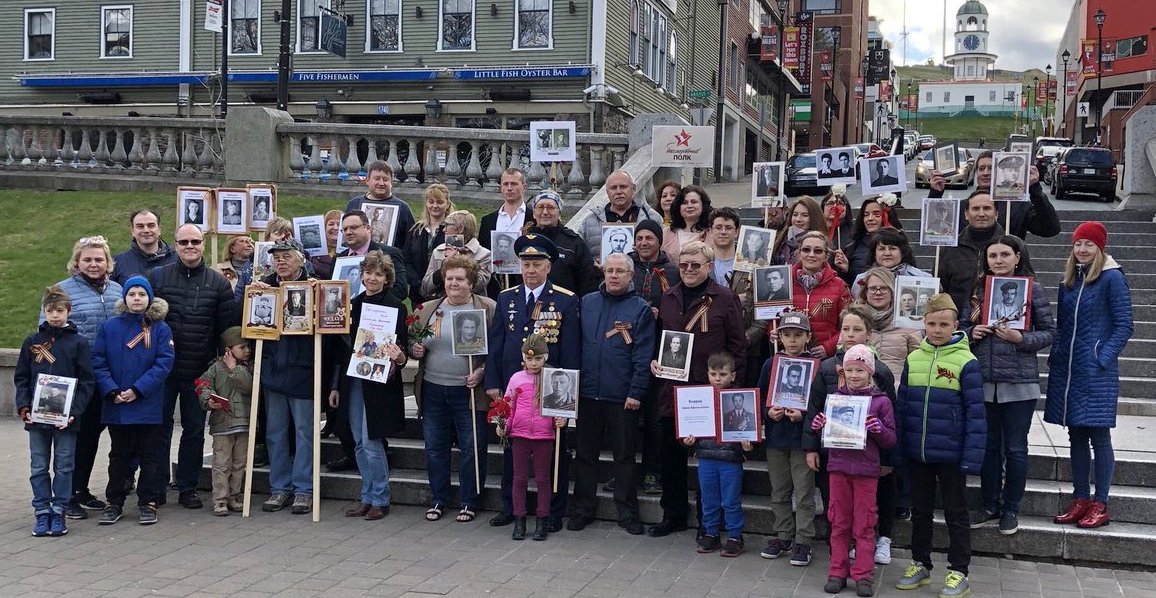
Montreal, QC
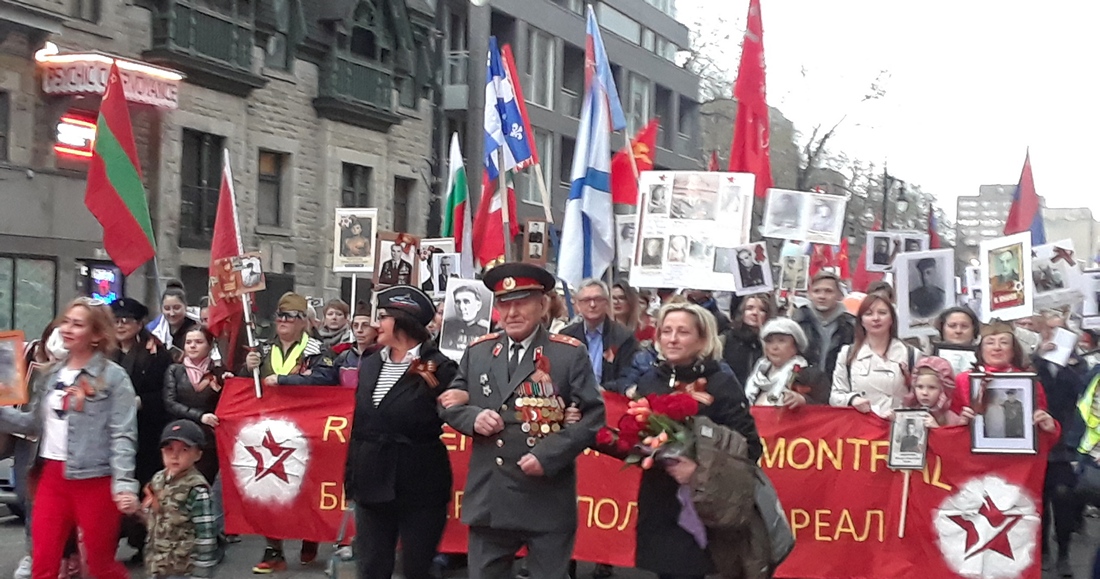
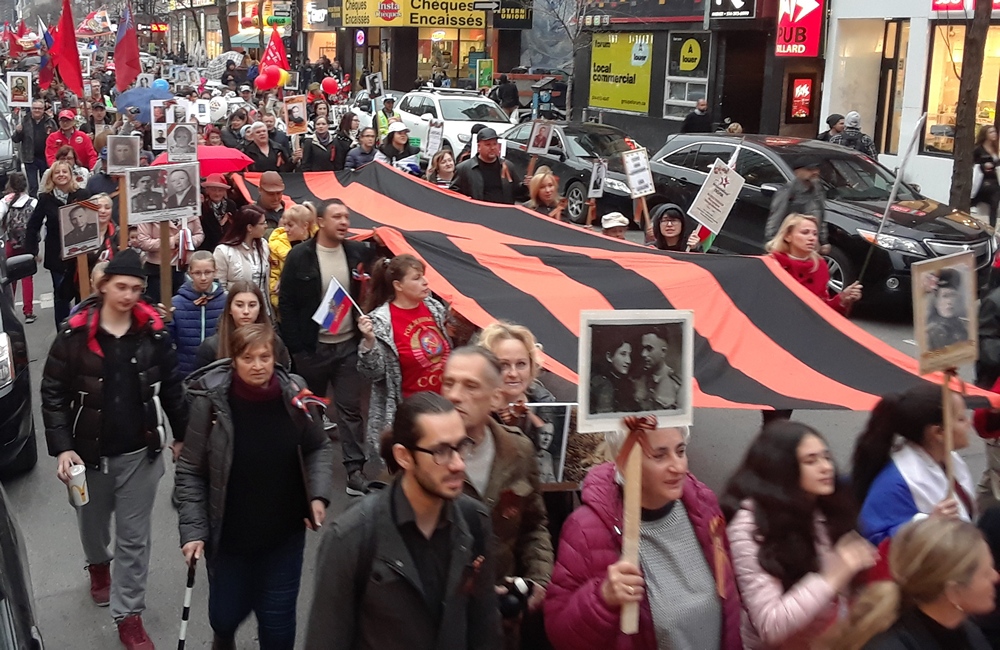 
Ottawa, ON
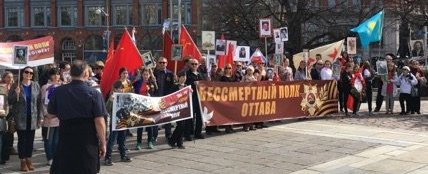
Toronto, ON

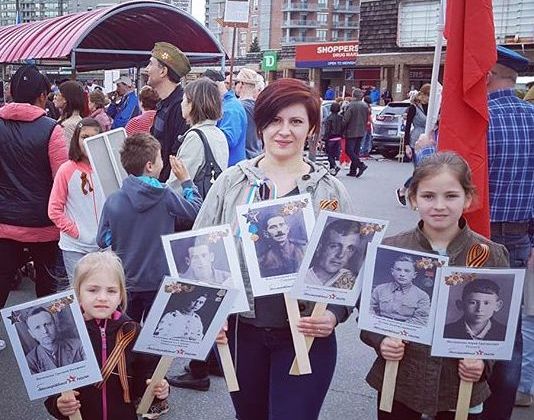 
Around the World
Moscow, Russia

 
Novgorod, Russia

Odessa, Ukraine

Kiev, Ukraine
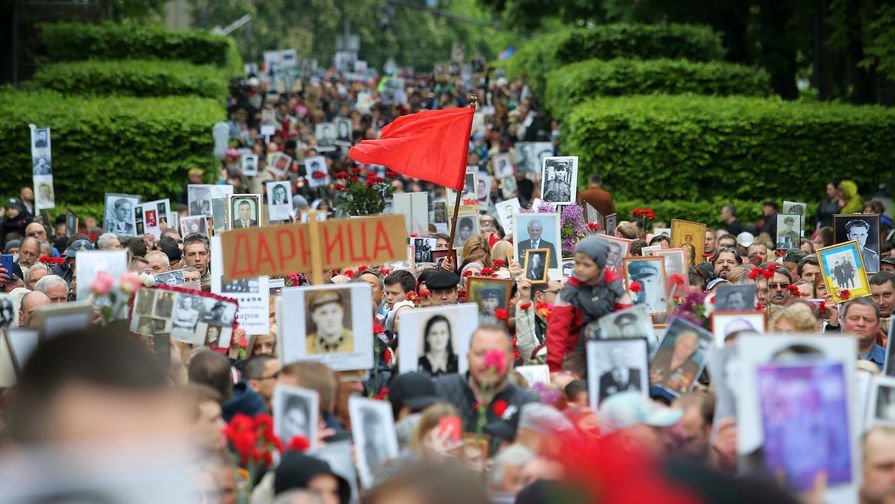
Prague, Czech Republic
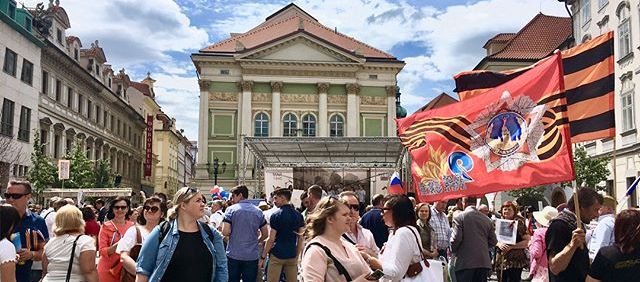
Bishkek, Kyrgyzstan
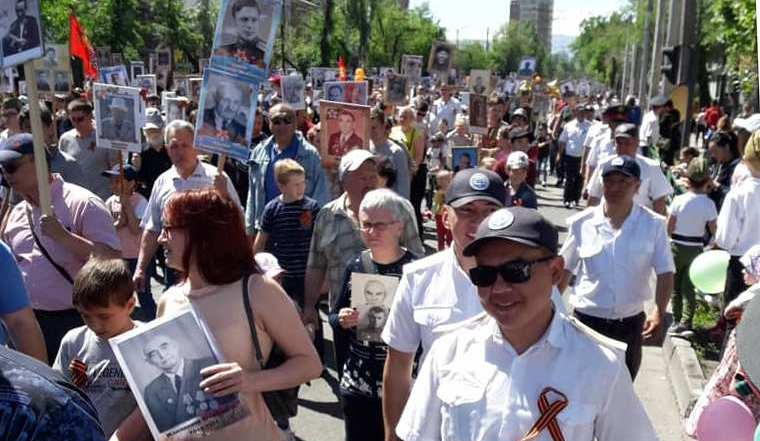
Kuala Lumpur, Malaysia
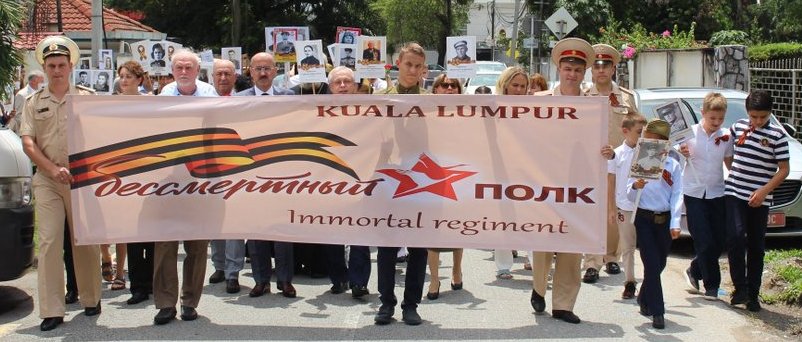
Hong Kong, China
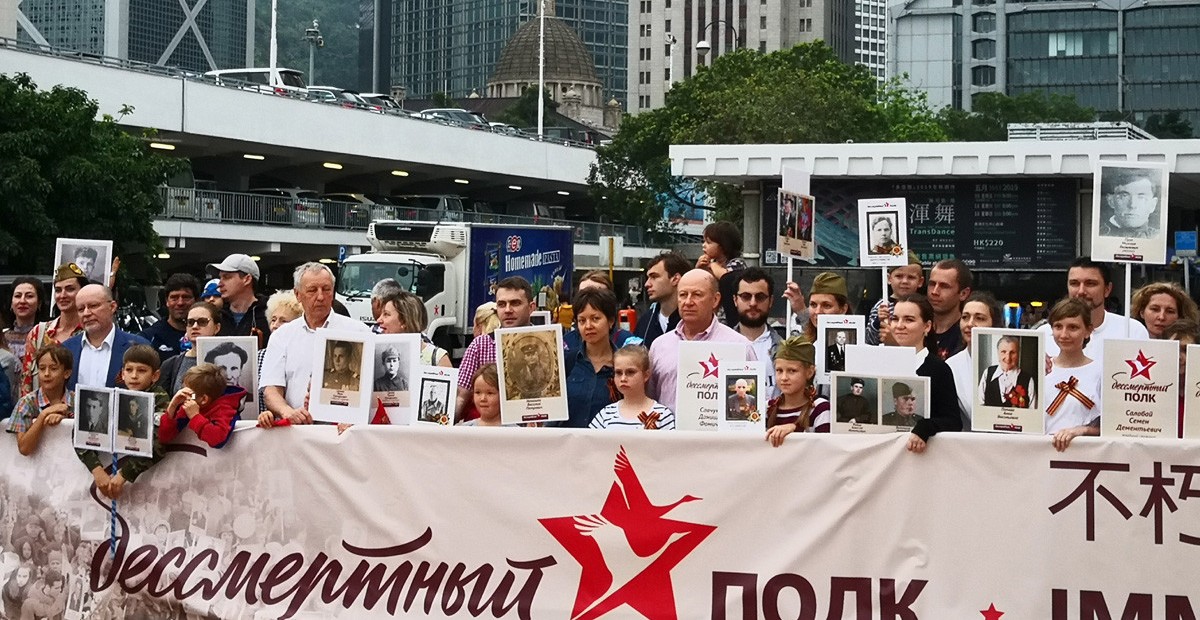
Busan, Korea

Vietnam
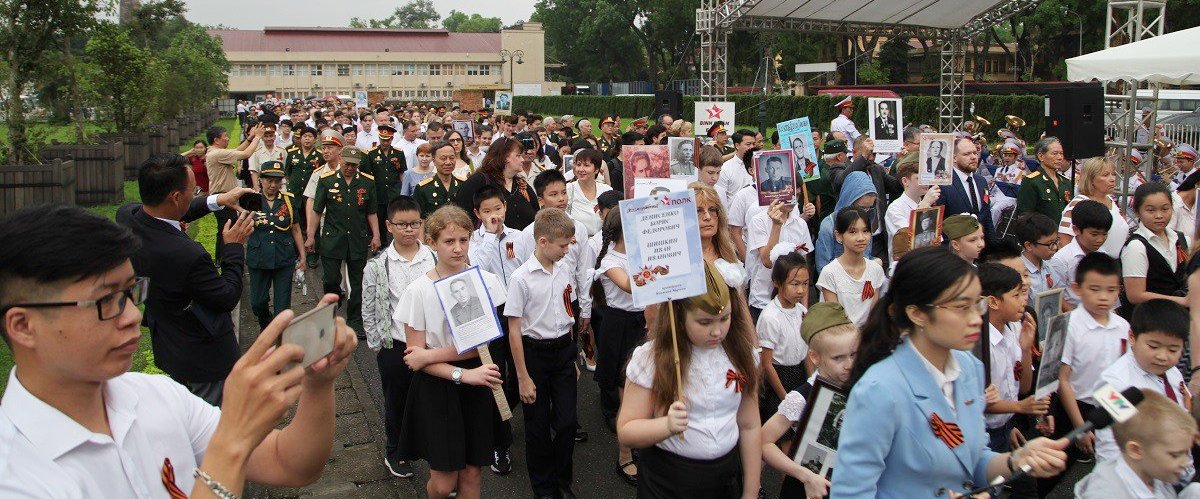
Tokyo, Japan
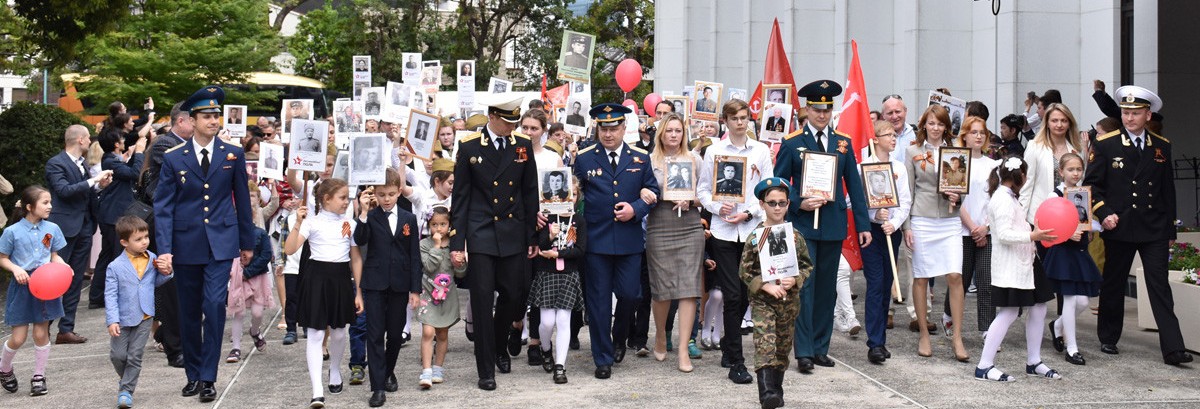
Brisbane; Sydney, Australia
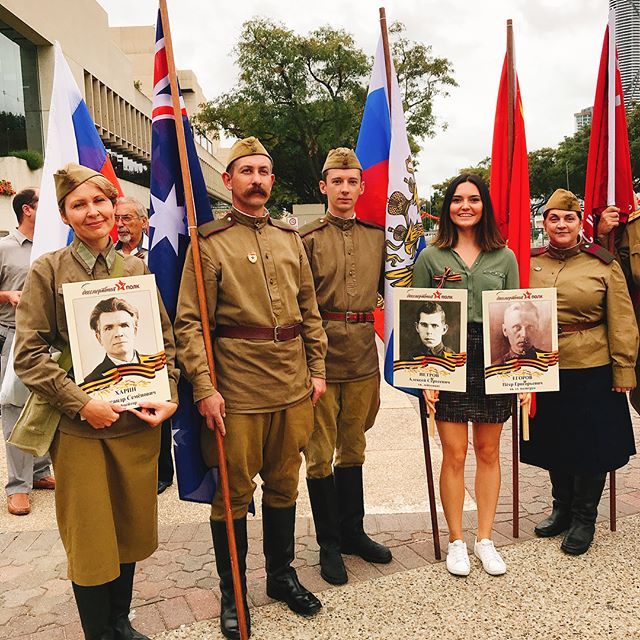 
Havana, Cuba
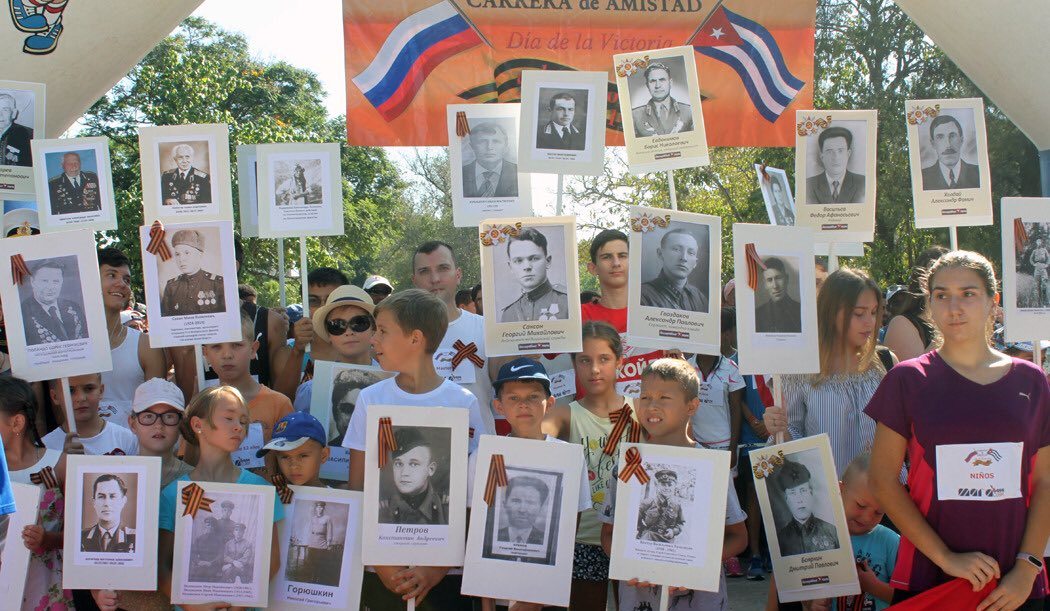 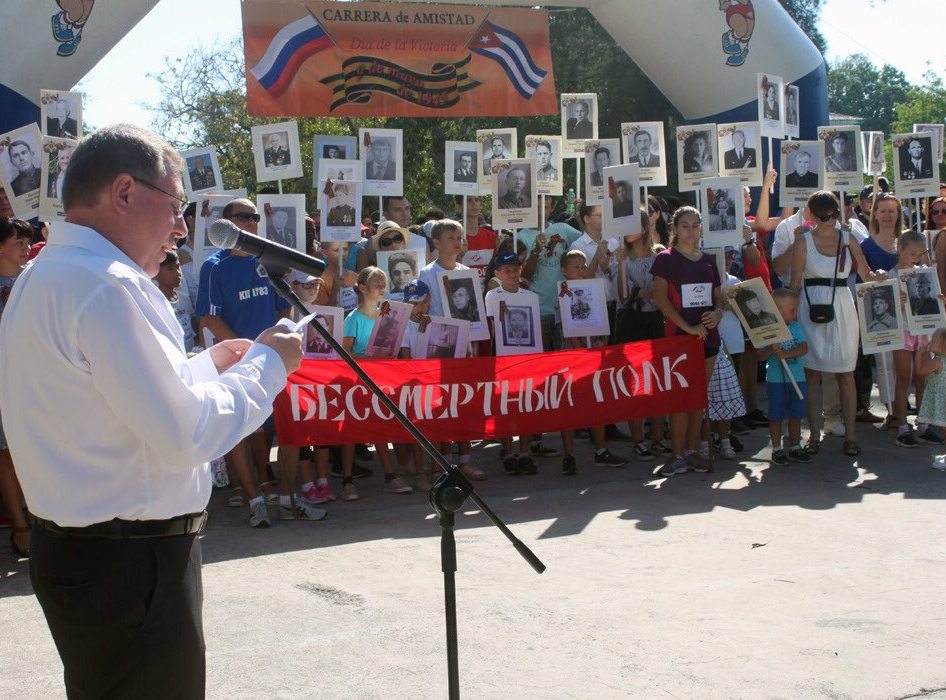 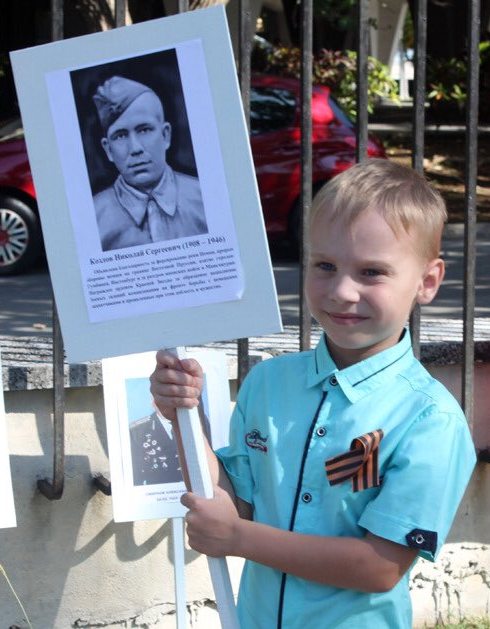
Buenos Aires, Argentina
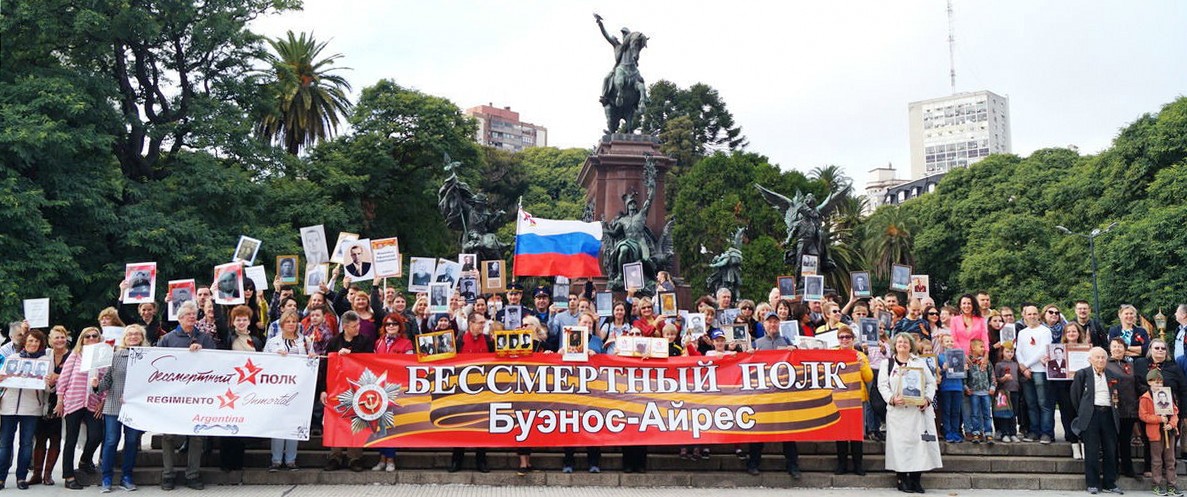
Washington, DC, USA

New York City, USA
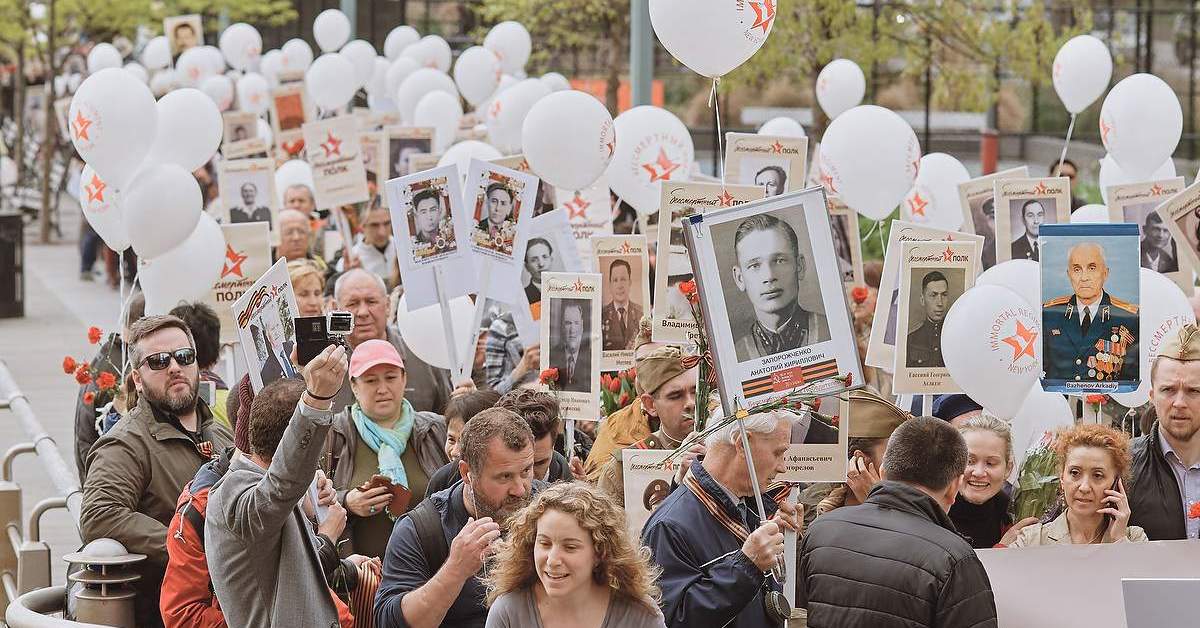
Seattle, WA, USA

London, England

Manchester, England
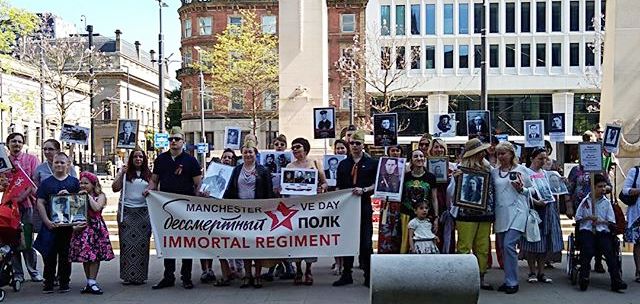
Denmark

Paris, France
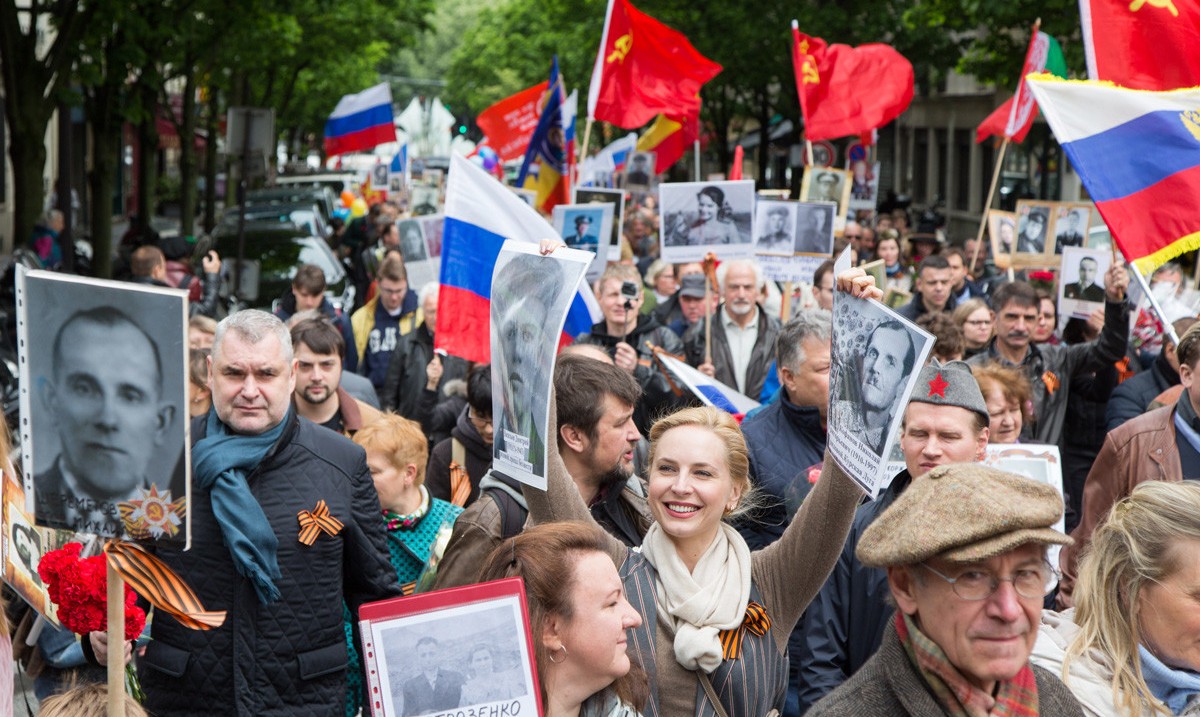
Rome, Italy
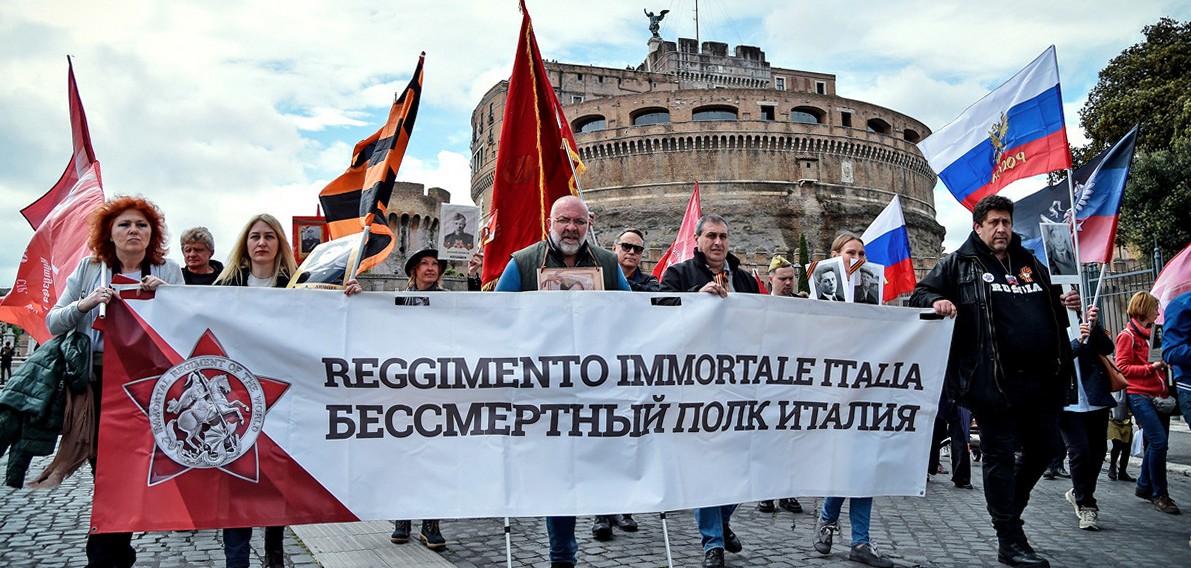
Supplement
Canada Post's Fraudulent Accounting Methods
|
|

(To access articles individually
click on
the black headline.)
PDF
PREVIOUS
ISSUES | HOME
Website: www.cpcml.ca
Email: editor@cpcml.ca
|



 Under current law and
international agreements Canada must grant a hearing to those claiming
asylum once they have reached Canadian soil, except for those denied
that possibility under the Safe Third Country Agreement with the U.S.
Under the proposed change, refugee claimants would no longer
automatically receive a hearing at the Immigration and Refugee Board
(IRB) after arrival in Canada to evaluate their claim for asylum if
they had previously made a refugee claim in another country with which
Canada has an information sharing-agreement. At present this appears to
include Australia, New Zealand and the UK as well as the U.S.[
Under current law and
international agreements Canada must grant a hearing to those claiming
asylum once they have reached Canadian soil, except for those denied
that possibility under the Safe Third Country Agreement with the U.S.
Under the proposed change, refugee claimants would no longer
automatically receive a hearing at the Immigration and Refugee Board
(IRB) after arrival in Canada to evaluate their claim for asylum if
they had previously made a refugee claim in another country with which
Canada has an information sharing-agreement. At present this appears to
include Australia, New Zealand and the UK as well as the U.S.[ This part was already
established when Prime Minister
Justin
Trudeau announced the creation of the Ministry of Border Security
and Organized Crime Reduction on July 28, 2018 and appointed Bill
Blair as Minister. Through perfidious sleight of hand, the
Trudeau government found a way to link vulnerable migrants with
border security and organized crime. By making the irregular
crossing of asylum seekers at Saint-Bernard-de-Lacolle, Quebec and
anywhere else in
Canada an issue of law and order, Trudeau turned those seeking
asylum into a criminal category, all in the name of upholding
fair treatment and rule of law, which is unconscionable.
Trudeau's mandate letter to the minister reads in part: "Your
goals are to ensure that our borders remain secure and to lead
cross-government efforts to reduce organized crime. You will work
to ensure Canada's borders are managed to promote legitimate
travel and trade while keeping Canadians safe and treating
everyone fairly, in accordance with our laws. You will also play
a leading role in our efforts to reduce gun violence. [You] are
the Minister responsible for our strategy to manage the challenge
of irregular migration."[
This part was already
established when Prime Minister
Justin
Trudeau announced the creation of the Ministry of Border Security
and Organized Crime Reduction on July 28, 2018 and appointed Bill
Blair as Minister. Through perfidious sleight of hand, the
Trudeau government found a way to link vulnerable migrants with
border security and organized crime. By making the irregular
crossing of asylum seekers at Saint-Bernard-de-Lacolle, Quebec and
anywhere else in
Canada an issue of law and order, Trudeau turned those seeking
asylum into a criminal category, all in the name of upholding
fair treatment and rule of law, which is unconscionable.
Trudeau's mandate letter to the minister reads in part: "Your
goals are to ensure that our borders remain secure and to lead
cross-government efforts to reduce organized crime. You will work
to ensure Canada's borders are managed to promote legitimate
travel and trade while keeping Canadians safe and treating
everyone fairly, in accordance with our laws. You will also play
a leading role in our efforts to reduce gun violence. [You] are
the Minister responsible for our strategy to manage the challenge
of irregular migration."[


 Although these workers came
to Quebec as part of the
federal
government's Temporary Foreign Worker Program (TFWP), the
specific program they fall under differs from others with regard
to applying for permanent residence. Persons admitted under their
program are able to apply for permanent residence after a few
years of service under the Regular Skilled Worker Program
(RSWP).
Although these workers came
to Quebec as part of the
federal
government's Temporary Foreign Worker Program (TFWP), the
specific program they fall under differs from others with regard
to applying for permanent residence. Persons admitted under their
program are able to apply for permanent residence after a few
years of service under the Regular Skilled Worker Program
(RSWP).

 These decisions have
introduced unreasonable delays and
significant financial obstacles for those Cubans seeking to
travel to Canada and will, amongst other things, cause
significant damage to business, cultural, scientific and sporting
relations. Indeed, they have already had a drastic impact on
academic exchanges between Canada and Cuba with some of the Cuban
academics scheduled to attend the annual conference of the
Canadian Association for Latin American and Caribbean Studies on
May 10-12 not able to procure visas.
These decisions have
introduced unreasonable delays and
significant financial obstacles for those Cubans seeking to
travel to Canada and will, amongst other things, cause
significant damage to business, cultural, scientific and sporting
relations. Indeed, they have already had a drastic impact on
academic exchanges between Canada and Cuba with some of the Cuban
academics scheduled to attend the annual conference of the
Canadian Association for Latin American and Caribbean Studies on
May 10-12 not able to procure visas. And now this! Is Canada so
attracted to the Trump
administration's anti-democratic counter-revolutionary attacks
against Venezuela's right to self-determination as to take its
revenge on Cuba? Or is it poised to admit that the United States
dictates Canadian policy? Shame on Canada either way.
And now this! Is Canada so
attracted to the Trump
administration's anti-democratic counter-revolutionary attacks
against Venezuela's right to self-determination as to take its
revenge on Cuba? Or is it poised to admit that the United States
dictates Canadian policy? Shame on Canada either way.

 The faculty passed a
unanimous resolution in support of the
students. Community support grew over the course of the sit-in,
with community organizations and church groups visiting students
and publicly expressing their support. With this support, the
students raised more than $2,700 for food and other
necessities.
The faculty passed a
unanimous resolution in support of the
students. Community support grew over the course of the sit-in,
with community organizations and church groups visiting students
and publicly expressing their support. With this support, the
students raised more than $2,700 for food and other
necessities.

 Recently, in what appears to be a
direct effort by CBP
and ICE
to undermine the organizing efforts, many migrant families are
now being released in nearby Yuma. Yuma is a city of about
100,000, with one migrant shelter housing 200 people. Officials
there were told the shelter was only to serve as an "overflow"
for migrants who could not be released at shelters in
Phoenix.
Recently, in what appears to be a
direct effort by CBP
and ICE
to undermine the organizing efforts, many migrant families are
now being released in nearby Yuma. Yuma is a city of about
100,000, with one migrant shelter housing 200 people. Officials
there were told the shelter was only to serve as an "overflow"
for migrants who could not be released at shelters in
Phoenix. This corps of asylum
officers is not an armed force and is
distinct from Customs and Border Protection (CBP) and Immigration and
Customs Enforcement (ICE). One of their main jobs is to ensure
the U.S. is upholding international and U.S. law concerning
refugees. This includes the fundamental principle of refugee law
called non-refoulement -- that a government must not send a
migrant back to a country where they would be persecuted or
imperilled.
This corps of asylum
officers is not an armed force and is
distinct from Customs and Border Protection (CBP) and Immigration and
Customs Enforcement (ICE). One of their main jobs is to ensure
the U.S. is upholding international and U.S. law concerning
refugees. This includes the fundamental principle of refugee law
called non-refoulement -- that a government must not send a
migrant back to a country where they would be persecuted or
imperilled. The implementation of Title III of
the
The implementation of Title III of
the  "The extraterritorial application
of unilateral sanctions is clearly
contrary to international law," the expert said. "I am deeply concerned
that one State can use its dominant position in international finance
to harm not only the Iranian people, who have followed their
obligations under the UN-approved nuclear deal to this day, but also
everyone in the world who trades with them.
"The extraterritorial application
of unilateral sanctions is clearly
contrary to international law," the expert said. "I am deeply concerned
that one State can use its dominant position in international finance
to harm not only the Iranian people, who have followed their
obligations under the UN-approved nuclear deal to this day, but also
everyone in the world who trades with them.


 The airstrikes targeted 20 residential
houses, a
residential
building and a mosque; three workshops; 20 targeted empty land,
cars, motorbikes, resorts, and other public and private property,
in addition to training sites and border control points belonging
to Palestinian armed groups. In addition to the artillery
shelling that took place in various areas of the eastern Gaza
Strip. [The Palestine News Network reported on May 7 that more
than 130 residential apartments were completely destroyed, while
700 others were partially destroyed in the Israeli attacks. --
TML Ed. Note.]
The airstrikes targeted 20 residential
houses, a
residential
building and a mosque; three workshops; 20 targeted empty land,
cars, motorbikes, resorts, and other public and private property,
in addition to training sites and border control points belonging
to Palestinian armed groups. In addition to the artillery
shelling that took place in various areas of the eastern Gaza
Strip. [The Palestine News Network reported on May 7 that more
than 130 residential apartments were completely destroyed, while
700 others were partially destroyed in the Israeli attacks. --
TML Ed. Note.]

 Immortal Regiment march in Montreal, May 9, 2019.
Immortal Regiment march in Montreal, May 9, 2019. Today, this anniversary
calls on everyone to once again
take a
stand that these times require -- to oppose wars of aggression
and occupation and the use of force to resolve conflicts between
nations, so that the dangers of another world war and other
calamities that threaten humanity in the most profound ways can
be prevented.
Today, this anniversary
calls on everyone to once again
take a
stand that these times require -- to oppose wars of aggression
and occupation and the use of force to resolve conflicts between
nations, so that the dangers of another world war and other
calamities that threaten humanity in the most profound ways can
be prevented.






























